#WHY can’t queer characters become&remain LEADERS
Text
Young Royals, parenthood, and reproductive autonomy (a meta I guess)
Especially with season 3 approaching, people talk a lot about whether or not Wilhelm will accept or reject the throne. This is often framed in terms of Wilhelm’s love for Simon, as well as his ability to own and express his queer (albeit as of yet unlabeled) identity. We also discuss this in terms of what sort of symbolic leader Wilhelm could be for Sweden.
There’s one question I want to add to the mix, when we consider Wilhelm’s future: to what extent is Wilhelm willing or eager to become a parent someday?
To build upon that a little further: to what extent is parenthood a choice for Wilhelm in a system where he is expected and required to father an heir, and probably a spare as well? What does his reproductive agency look like in that situation?
Now, I don’t want to turn this into a discussion of the reproductive mechanics of the line of succession. I know a lot of folks have speculated ways that can or can’t be addressed, and have talked about issues like surrogacy laws and adoption and whatever else. I also know there’s the possibility of the throne going to some relative or another. I’m not interested in that right now! Instead, I want to focus on the practical and emotional aspects of what it means for Wilhelm to contemplate future parenthood.
So let’s ask some more questions: does Wilhelm actually want children? If so, at roughly what age does he want kids? About how many kids does Wilhelm want? If he wants more than one kid, about how spaced apart does he want to have them? What are his views on how to parent? These are all questions that Wilhelm should have a choice to contemplate on his own, but likely won’t as long as he remains crown prince. The social norms of the monarchy likely dictate that becoming a parent happens at a certain time and pace, in a particular manner. Moreover there’s a certain prescribed way it has to all be presented to the public. Finally, Wilhelm knows that by having a kid while in the role as monarch, he would set that kid up for some of the same things he went through as a child, unless he takes extra care to break and dismantle toxic cycles. His child would be an heir to the throne and certain things would be expected of that child, the way they were of him.
The upshot of all of this is that YR raises questions about Wilhelm’s reproductive autonomy and future in a way we don’t usually get to see for cisgender male characters in teen dramas. (I would also say we get an intimations of this with August and Erik, as well—we’ve seen the way the royal court has exerted their influence over both when it comes to relationships and sexuality.) These kinds of conflicts and dilemmas usually only come up when they involve characters with uteruses. So it’s interesting to see the way that YR plays with this idea of reproductive autonomy, and extends the discussion.
Possibly a take that will bug some of my fellow fans, but I’m going to say it anyway: this is why I think Sara having a potential pregnancy or pregnancy scare could be on theme for season 3. I’m not saying it’s definitely gonna happen. What I am saying is that if it did happen, it would fit in with the show’s themes and dramatic questions as already established and would be more than just “drama.” (Drama in a program classified by its genre as a drama? You don’t say!) Sara would have to contemplate some of the same questions that Wilhelm contemplates about parenthood and parenting, and you could parallel their two arcs quite effectively.
Now, obviously they would also be in very different situations with different things at stake. Wilhelm’s class situation and reproductive organs are naturally different than Sara’s, so they’re naturally going to experience this parenthood differently. Sara would also have to engage with this question on a bodily level, as she’d be the one carrying a pregnancy to term, and that is a nine month process that takes a lot out on the body even in “healthy” pregnancies. (Pregnancy tends to be tougher for people with autism, too.) Finally, Sara will have to think about her own parents a lot, and what she absorbed from them. What does it mean for Sara to contemplate parenthood when she herself is the child of an abusive relationship?
Now, I want to point out that we’ve also seen YR use this strategy of parallels between characters for exploring other issues. Felice and August both struggle with perfectionism and body image, but that plays out differently for them due to differences in gender, race, and family structure. Simon and Sara grapple with similar questions about relationships and being in love and season 2, but experience that differently due to gender, sexual orientation, and neurotype. Simon and August both struggle with trauma around fathers with drug addiction, that causes them to engage with drugs in unsafe ways (August mostly by using, Simon mostly by dealing), but we know they’ll be seen differently by others because of their class. And so on. Part of what YR does so well is the way it shows how human beings can hold experiences in common, but still be divided in how they experience them based on systems that reinforce a social hierarchy. Paralleling Wilhelm and Sara around dramatic questions of future parenthood and reproductive autonomy could be really illuminating.
While I firmly believe that, if Sara has a pregnancy situation/pregnancy scare, Sara herself should be centered in that particular plotline, we also know such a plotline would likely involve August as the person who donated half the DNA of the fetus in question. Which then throws August’s arc into a suddenly very real and frightening place: he’s in a position where he could perhaps in the most basic sense fulfill the “destiny” ordered of him by the Society and by the machinations of the royal court members who want him as Wilhelm’s backup. (We know what that phone conversation he has with Jan-Olof is really about, and again I remain grossed out.)
And yes, we also know that August has exercised his capacity to seriously harm others multiple times throughout seasons 1 and 2, and that he is about to be in serious legal trouble for leaking the video. Even without that, what would it mean for him to have to think about these questions of parenthood when he hasn’t fully processed the trauma and grief of losing his own father, or had a chance to heal his fractured relationship with his mother? Whether you come at the horror of August fathering a child from the angle of August as someone who has relentlessly hurt others, or from the angle of August as someone with deep, parent-related pain of his own and minimal support to navigate that pain, I think ultimately what we’re being shown here is the ruthlessness of monarchy as it relies on reproduction to keep itself going. Does it matter that an heir to the throne is loved and celebrated for who they are and given therapy for their trauma, as long as the heir exists, reaches adulthood, and one day produces another heir?
Which then opens up another question that I think once again applies to Wilhelm, and maybe Sara as well. If having children is a way to maintain and preserve status for the upper classes, what does that mean for Wilhelm? Can Wilhelm believe his mother loves him, if having children is more a mandate for someone in her position than a choice? This may be a question Wilhelm has to sit with, and it’s possibly something Kristina needs to sit with too. Has Kristina ever considered Wilhelm a loving choice she’s making, rather than a destiny? I think this would be a great opportunity to explore Kristina as a person, and not just as a royal or a mother.
Meanwhile, having children is expensive and consumes time and energy, and someone who is working class and autistic like Sara is going to have fewer resources to deal with this situation. Luckily, as someone who lives in Sweden, she has safe and reliable access to abortion (glaring at my own horrendous country here) which I imagine will be the option she would end up choosing in that kind of plotline. But that doesn’t mean she won’t have to stress over her situation or face gossip or even negative press attention because of it. Not to mention the way Sara’s own conscience may weigh on her, if she’s pregnant with the child of someone who harmed her brother, her (ex?) best friend, and other people so dramatically? Is there a part of her that would kind of want the child anyway, perhaps in another circumstance? What would it mean, to want that child? This sounds like something Sara and Linda could discuss, and maybe come to understand one another on.
Lisa once said one of the dramatic questions of Young Royals was whether or not people become their parents. If we are going to engage with that question, one way to raise the stakes around it is to make the question of parenthood and reproductive autonomy more real and urgent. Again, I’m not saying this will happen. This is not a season 3 prediction post. But I do think if it did happen, it would be in line with what we’ve seen from the series and its exploration of families and privilege.
#young royals#my meta#wilhelm young royals#sara eriksson#august young royals#pregnancy mention#abuse mention#reproductive autonomy in fiction#these ideas have been brewing for a while and I’ve yelled to heliza about them a lot#thank you for reading and being willing to think about this for those of you who read!
126 notes
·
View notes
Text
...it’s 2020.
Can we please stop pitting queer women against eachother, especially over headcanons.
#tiger’s roar#fandom wank#...yes it’s about froz2.#okay. so I always hc Elsa as aroace.#buuuuut my ace ass *always* hc’s characters as aspec#and elsa and honeymaren are adorable. let the wlw have their day with coding and/or hcs#what DOES tick me off enough that I’ll prolly never watch froz2?#Elsa abdicating.#WHY. just WHy.#especially when she’s queer coded#(you all know what THAT reminds me of with a certain fandom)#WHY can’t queer characters become&remain LEADERS#ESPECIALLY if they might maybe possibly have a love interest (but oh noooo~ censorship because money!)#can THAT be the fandom discourse vs attacking eachother over Which Queer Spec and What Rep#(...and who says Elsa can’t be an ace wlw grey or demi romantic?! best of both??? but whatever. not the point.)
3 notes
·
View notes
Text
Why Cap Being Internally Closeted Is Not Only Possible, But Valid Representation
i wrote this to a lot of mitski and onsind, so you can’t blame me for any feelings that bleed through
now i don’t know if it actually exists, but i’ve heard of there being a lot of discourse surrounding the captains story arc regarding his sexuality- i believe the general gist is that having a queer character that remains closeted to themselves is either unrealistic or ‘bad’ representation, and as someone who really treasures the captain and relates to his story so far a lot, i thought i might break this down a bit.
i’ve divded up every complaint i’ve heard about this into four main questions which i’ll be covering below the ‘keep reading’, because this is gonna be pretty comprehensive. full disclaimer i reference my experiences as an ex-evangelical non binary butch lesbian a couple times, and i spent a year studying repression and the psychological impacts of high demand sexual ethics for my graduating sociology paper, so this is coming with some background to it i swear
the big questions:
can you EVEN be gay and not know it????
but isn't this just ANOTHER coming out arc, and aren't we supposed to be moving beyond those?
but if cap can't have a relationship with a man because he's a ghost, what's the point?
since cap's dead, isn't this technically bury your gays, and isn't that bad?
1. "but is it really possible to not know? Isn't that bad representation?"
short answer: no and no.
before i get into the validity of the captain's ignorance about his own orientation as 21st century rep, let's break down how the hell the captain can be so clearly attracted to men and still not even consider the possibility that he might be gay, as brought to you by someone who literally experienced this shit.
the captain's particular situation is both a direct result of the lack of information around human sexuality he would have had (aka clear messaging that it's actually possible for him to be attracted to men. i don't mean acceptable or allowed, i mean physically capable of happening- the idea that orientations other than heterosexual exist and are available to him, a man), and a subconscious survival mechanism. the environment in which he lives is outright hostile to gay people, while the military man identity he has constructed for himself doesn't allow for any form of deviation from societal norms, let alone one so base level and major. as a result of this killer combo of information and environment, instincts take over and the mind does it's best to repress the ‘deviant’ feelings until a. one of these two things changes, or b. the act of repression becomes so destructive and/or exhuasting that it becomes impossible to maintain. the key to maintaining a long-term state of repression of desire is diverting that energy elsewhere, and a high-demand group such as the military is the perfect place for the captain to do this (this technqiue is frequented by religions and extremist ideologies worldwide, but that’s not really what we’re here to focus on).
while the brain is actively repressing ‘deviant’ feelings (aka gay shit), this doesn't mean you don't experience the feelings at all. when performed as a subconscious act of survival, the aim of repression is to minimise/transform the feelings into a state where they can no longer cause immediate danger, and something as big as sexual/romantic orientation is going to keep popping up, but as long as the individual in question never understands what they’re feeling, they’ll be able to continue relatively undisturbed. you know how in heist movies, the leader of the group will only tell each team member part of the plan so they can’t screw things up for everyone else if they get caught? it’s kind of like that.
this is how the captain appears to have operated in life AND in death, and it’s a relatively common experience for lgbtq people who’ve grown up in similar circumstances (aka with a lack of information and in an unfriendly-to-hostile environment), and accounts for how some people can even go on to get married and have children before realising that they’re gay and/or trans.
personally, while i can now identify what were strong homo crushes all the way back to childhood, at the time i genuinely had no idea. there was the underlying sense that i probably shouldn't tell people how attached i was to these girls because i would seem weird, and that my feelings were stronger than the ones other people used to describe friendships, but like-like them in the way that other girls like-liked boys? no way! actually scratch that, it wasn't even a no way, because i had no idea that i even could. i even had my own havers, at least in terms of the emotional hold and devotion she got from me, except she treated me way less well than cap’s beau. snatches of the existence of lgbt people made it through the cone of silence, i definitely heard the words gay and lesbian, but my levels of informations mirrored those that the captain would have had: virtually none, beyond the idea that these words exist, some people are them, and that's not something that we support or think is okay, so let's just not speak about it. despite only attending religious schools for the first couple years of primary, until i got my own technology and social media accounts to explore lgbtq content on my own- option a out of the two catalysts for change- the possibility of me being gay was not at all on my radar. don’t even get me started on how long it took me to explore butchness and my overall gender, two things which now feel glaringly obvious.
when shit starts to break down, you can also make the conscious choice to repress which can delay the eventual smashing down of the mental closet door for a time (essentially when the closet door starts to open, you just say ‘no thanks’ and shut it again by pointedly Not Thinking About It). in the abscence of identifying yourself by your attractions, it becomes quite common to identify with a lack- in my case, this meant becoming proud of how sensible and not boy crazy i was, and in the captain’s case, this means becoming proud of how sensible and not sensuous/wild (aka woman crazy) he was, identifying with his LACK of desire for women and partying (which, even in the 40s, involved the expectation of opposite sex romances and hook ups). i’m not saying that’s the only reason he’s a rule follower, but i think the contrast between About Last Night and Perfect Day pretty much support this. (the captain getting on his high horse about general party antics that he inherently felt excluded from because of underlying awareness of his difference & his tendency to project his regimented expectations of himself onto others, vs. joining in the reception party, awareness of how the environment supports difference in the form of clare and sam, and relaxing his own rules by dancing with men- the captain doesn’t mind a party when feels like he has a place there.)
so the captain was operating in a high demand, highly regulated environment (primarily the military, but also early 20th century England itself), with regimented roles, rules, and expectations. working on the assumption that he wouldn't have had out/disclosing lgbt friends, he would have had little to no exposure to lgbt identities, and what information he did receive would have been hushed and negatively geared. while my world started to open up when i started high school was allowed to have my own phone + instagram account, resulting in me realising something wasn't quite 'right' within a few years (making me a relatively early realiser compared to those who don't come out to themselves until adulthood), in life the captain never had that experience. he didn't receive the information he needed, his environment didn't grow less hostile. with the near-exception of havers related heartbreak, his well disciplined and lifelong method of repression never became destructive/exhaustive enough to permanently override the danger signals in his mind and allow him to put his feelings into words. neither of the most common catalysts for change happened for him, so he continued as usual, even after his death.
BUT, and here’s where we come to why this is actually great representation, arrival of mike and Alison represents the opening up of new world. for the first time, the captain is actively made aware of the fact that his environment is no longer hostile, and better than that, it’s affirming. he’s also getting access to positively geared information about lgbtq people and identities, so option a of the two catalysts for change is absolutely present, and resoundingly positive.
the captain’s arc is also relatively unique as it acknowledges the oppressive nature of his environment, but actually focuses on the internal consequences, and the way that systems like those that the captain lived in succeed because they turn us into our own oppressors. for whatever reason, we repress ourseslves, and often can’t help it, and i find that the significance of the journey to overcome that is often overlooked in more mainstream queer media. perhaps it’s just not very cinematic, or it remains too confronting for cishet audiences, but ghosts manages to touch on it with a lovely amount of humour and hope. Jamie Babbit’s But I’m A Cheerleader is another favourite piece of queer media for the same reasons.
not only does it show this, but as the captain continues to get gayer and lean into some of his less conventional traits (like an interest in fashion and the wedding planning), it shows lgbt people who have been or are going through this that there CAN be a positive outcome. it takes a lot to unlearn all the things that have painted you as wrong, especially when a massive institution is desperate to continue doing so, but you can do it, you can be happy, and it's never too late. (i've been meaning to say that last point for ages for ages, but a mutual beat me to it here)
2. not just another coming out arc
i absolutely support the demand for queer stories that don’t center around coming out (it’s like shrodinger’s queer: if you’re not coming out on screen, do you really even exist?), but i don’t align with the criticisms that the captain should already be out. for the reasons mentioned above, the captain’s particular story is fairly different to the ‘young white teenager who mostly knows gay is fine, it’s just everyone else that’s got the problem, but have a unremarkably straight sounding soundtrack, a trauma porn romance, and a cishet saviour’ that we keep seeing. the captain’s ongoing journey with his sexuality emphasises the overaching theme of the show: recovering from trauma and humanity’s endless capacity for growth, and i think that’s worth showing over and over again until it stops being true.
additionally, while the captain’s journey regarding his gayness is a big part of his character and story, ghosts makes it clear that it’s not the ONLY part, and being gay is far from his ONLY characteristic or dramatic/comedic engine. the fact that i’m even having to congratulate ghosts for doing that really shows how much film and television is struggling huh.
while all queer media is, and should be, subject to criticism, i think if it helps even one person then it absolutely deserves to exist, and i can say i’ve found the captain’s journey to be the lgbt story i’ve found that’s closest to my own, which says a lot considering he’s a dead world war 2 soldier who hangs out with other ghosts including a slutty Tory, a georgian noblewoman, and a literal caveman.
3. if captain gay, why he no have boyfriend????
another complaint that’s been circulating is that since the captain doesn’t, and likely won’t, have a boyfriend, that makes him Bad Representation because it follows the sad single gay trope. i kind of get the logic from this one, and a lot of it is up to personal interpretation, but part of me really enjoys the fact that the captain’s journey towards accepting himself is separated from having a relationship.
coming out is often paired with having romantic/sexual relationships (either as the reason or reward for doing so). my own struggle with repression didn't end the second that came out, and i still struggle with letting myself develop & acknowledge romantic feelings as a result of actively shutting them (and most other feelings in general) down for years, and statistics show that lgbtq youth in particular tend not to live out their 'teen years' until their twenties. by not giving cap a relationship straight away, ghosts separates the act of claiming identity and sexual orientation from finding a partner (two things which are, more often than not, separate), and also provides some very nice validation to folks who have yet to have the relationship they want, especially when lots of mainstream queer media is now jumping on the cishet media bandwagon of acting as if every person loses their virginity and has a life defining relationship at sixteen. it’s essentially a continuation of the earlier theme of “it’s never too late”, and who’s to say the captain won’t get a gay bear ghost boyfriend to go haunt nazis with??? people die all the time, it could happen.
(also, i think him and julian will have definitely shagged at least once. it was a low moment for both of them and they refuse to speak of it.)
lots of asexual/ace spectrum fans have come out to say how much they’ve loved being able to headcanon cap as ace, and while that’s not a headcanon i personally have, i think it’s brilliant that ace fans feel seen by his character- we’re all in this soup together babey (and sorry for cursing everyone still reading this with that cap/julian headcanon. i’m just a vessel)
4. “okay, but cap’s a GHOST- doesn’t that make this Bury Your Gays?”
this is a bit of a complex one, but i’m going to say no as a result of the following break down.
Bury Your Gays (BYG), aka the trope where lgbtq characters are consistently killed off (and often with a heavy dose of trauma, while cishet characters survive) is probably one of my least favourite lgbt media tropes. BYG has two main points:
1. the lgbt character is killed, thus removing them from story entirely- hence the use of the phrase ‘killed OFF’ (killed off of the show/film)
2. the character’s death reinforces the perception that lgbtq people’s lives must end in tragedy, instead of being long and fulfilling, or are inherently less valuable. bonus points if the character is killed in a hate crime or confesses same-gender love right before they die (that one implies that queer love genuinely has no future!)
not every death of an lgbtq character is bury your gays, and i personally feel that the captain is an example of an lgbt death that isn’t.
first of all, while the captain is dead, so are the vast majority of characters in ghosts. the premise of the show means that death is not the end of the line for its characters- for most of them, it’s the only reason we get to see them on screen at all. as such, the captain being dead doesn’t remove him from the story, so point one is irrelevant.
at the time of posting, we don’t know how or why the captain died, but we've had nothing to suggest his death was in any way related to his latent sexuality, so his mysterious death doesn’t actively play into the supposedly inherent tragedy of queer lives, nor the supposedly lesser value. that’s as of right now- since we don’t know the circumstances of his death it’s a little tough to analyse properly. while the captain’s life absolutely features missed opportunities and it’s fair share of tragedy, hope and growth (which seems to be the theme of this post) abounds in equal measure. the captain may not be alive, but we DO get to see him growing and having a relatively happy existence, that for the most part seems to be getting even better as he learns to open up and be himself unapologetically- that doesn’t feel like BYG to me.
while writng this, it’s just occured to me that death really is a second chance for most of the ghosts, especially with the introduction of alison. from mary learning to read, to thomas finding modern music, they’ve all been given the chance explore things they never could have while they were alive, and hopefully grow enough to one day be sucked off move on.
in conclusion,
i love the captain very much and i hope his arc lives up to the standards it’s set so far. i don’t know where to put this in this post, but i’d alo like to say i LOVE how in Perfect Day, the captain wasn’t used as an educational experienced for fanny at all. i am very tired of people expecting me to be the walking talking homophobe educator and rehabilitator, so the fact that it’s alison and the other ghosts that call fanny out while the captain just gets to have fun with the wedding organisation made me very happy.
here’s a few other cap posts that i’ve done:
the captain’s arc if adam and the film crew stayed
a possible cap coming out
the captain backstory headcanon
if you’ve read this far,
thank you!
also check out @alex-ghosts-corner , this post inspired me very much to write this
#i subluxed all my fingers and wrists doing this but worth it#bbc ghosts#bbc ghosts headcanon#bbc ghosts analysis#the captain#caphavers#the captain x havers#ben willbond#lgbt representation#lgbt rep#queer media#lgbt media
205 notes
·
View notes
Text
Star Wars Novel Rankings
In celebration of the end of this year, I made a tier list of all of the Star Wars novels I’ve read since I joined this fandom in 2017 (which you can use to rank these books too). And I named all the tiers in a dorky but appropriate fashion. I would love to hear your thoughts on my rankings, as well as how you’d rank the books yourself! I’ve had a blast reading Star Wars novels from both Disney’s canon and the Legends extended universe over these past 3 years. Here’s to many more years of reading stories from the galaxy far far away!
I put longer (but not more coherent) thoughts below the cut.
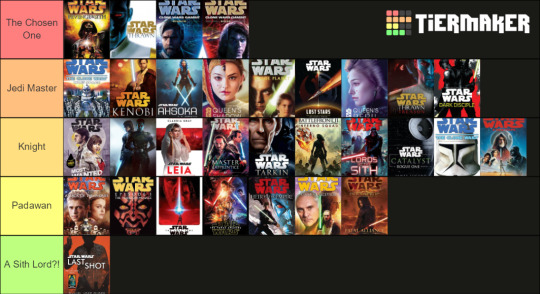
The Chosen One: Bringing Balance to the Force and My Depressed Soul
1. The first spot of top tier had to go to Matthew Stover’s Revenge of the Sith novelization for obvious reasons. You simply cannot beat it. It’s a masterpiece. I literally had to put the book down to scream when I read the prose associated with the opening battle over Coruscant. It gave a whole new meaning to the triumphant music and the synchronous twirling of Obi-Wan and Anakin’s starfighters as they weave through blaster-fire in the battle over Coruscant. The rest of the book is the same way. You can’t put it down. I have wAyyYyYy too many feelings about this book oh my god.
2. Thrawn was a surprising book for me. For being centered on an admiral of the Empire’s navy, it had so much heart in it! I loved reading from Eli Vanto’s perspective too. god dammit I love that freaking Wild Space hillbilly dweeb with all my heart. I think his experiences getting to know Thrawn and learning from him guides the reader to feel much the same way as Eli by the end. Thrawn is a trusted friend, not the enemy you expect him to be. I could have done without Arihnda Pryce but she’s supposed to be unlikeable so I won’t blame Timothy Zahn this time.
3. The Clone Wars Gambit duology is basically Karen Miller writing fanfic and I’m HERE FOR IT. As is tradition with Karen Miller’s Star Wars novels, the emotions are dialed up the eleven. Our favorite dumbass Jedi team is back at it again with a mission to save the galaxy and this time they end up going undercover as two lumberjacks from the boonies. Anakin holds an energy shield back from collapsing with his bare hands like a total badass. Obi-Wan is in love with another woman despite it always ending in tragedy, while also bickering like a married couple with Anakin every ten seconds. get a fucking room, you two. These two books inspired one of my fics so they’re near and dear to my heart.
Jedi Master: These Books Have A Seat On The Council Too
4. Wild Space was appropriately named, I’ll tell you that. It’s a wild ride from start to finish. *slaps the front cover* this book can fit so much of Obi-Wan’s suffering in it! @forcearama has elaborated on the many reasons why this book is a gem in Snark Wars blog posts (linked here). It’s also the beginning of the best team-up since Anakin and Obi-Wan...Bail and Obi-Wan! These two bastards get under each other’s skin but it makes for the perfect character development. This book is the reason I screech with delight whenever Bail Organa appears on screen, or is mentioned in conversation. Bail gets a mysterious tip about trouble on a planet, and Obi-Wan decides to go with him to investigate. Cue Sith-induced suffering. It’s cool to see a normal person experiencing the weirdness of Force sensitives and how the world has this extra level of sensory information in it. Plotwise this one isn’t the best, but I think the interactions between characters really shine in this novel. Karen Miller’s writing is like a cup of hot chocolate to me. Indulgent character insight, full of sweet moments, has a bunch of extra marshmallowy dialogue, you’re reading it to have a good time but not to be satisfied with plot. You get me?
5. Do I even have to explain myself here? Kenobi by John Jackson Miller is both an interesting western-style tale set on Tatooine, and a beautiful character study of a man stricken with grief he keeps suppressed. How does one continue on when their whole family was murdered and their whole culture burnt to ash? I wanted to give Obi-Wan a hug the entire time I read this. The characterization was spot-on, from the way he wrangled animals to the way he severed a man’s arm off in a bar with his lightsaber. And when he meets a woman named Annileen Calwell, or Annie for short, Obi-Wan can’t bring himself to call her by her nickname ever and if that doesn’t just break your damn heart fucking fuck.
6. Ahsoka was the first Disney canon book I ever read and it kickstarted my love for E.K. Johnston. The writing is simplistic, but that makes it easy to jump into. Overall, it’s a quick and enjoyable read. By far the best parts are the flashbacks that mull over memories Ahsoka has of the time before Order 66. That shit hits you right in the heart, man. And the part where Ahsoka equates Obi-Wan and Anakin to her adoptive family ohhhhhhh god the tears they flow like a river. There are scenes that allude to Ahsoka becoming the vital part of the Rebellion we know her to be from Rebels, balanced with her current struggles to survive and find herself. Despite having cast away her identity as a Jedi and having any remaining bits of her culture destroyed by Palpatine, Ahsoka shows us all how bright a hero can shine in the darkest of times. AND SHE WAS WRITTEN AS QUEER! finally some good fucking food.
7. Oh shit, another E.K. Johnston book? Don’t be surprised. She’s a prequel fan and so am I, hence why Queen’s Shadow is so high on the list. E.K. Johnston pays homage to our favorite queen and badass senator Padme Amidala. There’s politics, there’s solidarity between female characters, and Bail Organa is in it so you KNOW I simply must give it a high rating. All jokes aside, I thought the story added lots of little details to the world of Star Wars without it being all stereotypical sci-fi nerdy language. You know how people want to describe something beyond our technological capabilities so they throw a bunch of nonsense together like “pre-praxis crystal bio-anode circuitry”? I’m looking at you, Karen Miller, I love you but please. There is none of that in this book. It makes sense, it adds color and culture and life to the worlds of Star Wars. Most of all, it devotes time and love to developing Padme outside of her place in canon as Anakin’s wife, Queen of Naboo, and Senator. She is all of these things, but she’s human too. I do agree that the pacing is slow, but it’s something meant to be savored, I think. E.K. Johnston really shines when she’s writing dialogue because she gets these characters. That’s something to appreciate, because not all canon books agree with the way we’ve perceived the characters as an audience.
8. Rogue Planet chewed me up, spit me out, and declared me an even bigger stan for The Team. People who say Qui-Gon would have been a better master for Anakin can ~get out~ because I could read about these two hooligans getting neck deep in space shenanigans all damn day. Anakin is like twelve, which is a time in his training that we don’t get a lot of in canon. Personally, I think it was equal parts heartwarming and funny to read about their adventures. There is some angst sprinkled in there because hey, we’re reading about Anakin here, let’s not forget the emotional trainwreck that is Anakin Skywalker. The duo is sent to a planet that makes super fast ships that are ?sentient? or at least biologically active. They bond with the pilot, which makes Anakin perfect for this mission. There’s a scene where these little floof things attach all over tiny Anakin because he’s so strong in the Force and it’s god damn adorable how dare he?? I’d probably rate this one even higher if I read it again, but it’s been awhile. Characterization is spot on and reminiscent of Matthew Stover’s writing in how it highlights the strong bond between Obi-Wan and Anakin, how they’re fated to know each other. I’m a sucker for soulmates, what can I say?
9. Lost Stars reads like a movie. Not a script, but just the perfect amount of detail that you can imagine the scenes but the pacing is still quick, the dialogue smooth and natural. I couldn’t help wishing this was a film because the story was so all-encompassing. The highs and lows of the emotions of both protagonists, their relationship developing, the differences in culture. Folks, this book has it all! It’s a totally different perspective on the events of the original trilogy, seen from the side of Imperial cadets training to become pilots. Eventually, one splits off and joins the Rebellion while the other perseveres in the Empire. It’s like star-crossed lovers, but covers so much more ground than that. And the characters are fully developed. These original characters knocked my socks off, and that’s hard to do since I’m usually an Obi-Wan stan through and through. For anyone uncertain of reading Star Wars novels, this book is a great place to start. Action-packed, emotion-filled, and stands on its own despite weaving perfectly into the established universe. What more could you want?
10. Back at it again with the prequel shit, amiright? Queen’s Peril is E.K. Johnston’s most recent Padme-centric novel and it does not disappoint fans that wanted a taste of the Queen’s side of the story. Set during the events of The Phantom Menace, we get a “behind the curtain” look at how all of the handmaidens came to be more than their title suggests. There’s teenage girls getting stuff done! It makes more sense why Padme was elected ruler of her home-world, and you come to appreciate that a royal leader is not alone; there’s actually a whole team at her side to help her overcome everything from the drudgery of daily governing to Trade Federation blockades that threaten to starve her people. I think if you enjoyed Queen’s Shadow, you’ll enjoy this book a lot. For those that are unfamiliar with Johnston’s work, I wouldn’t recommend this one first because it does cover events you’ve already seen in movies and therefore is a less suspenseful companion to them. On the other hand, because it does tie in with TPM, it doesn’t suffer from the pacing issues of Queen’s Shadow to the same degree. I read this all in one sitting, so it’s definitely fun, but wasn’t compelling enough in its character development to elevate the book past some of the others I’ve listed already.
11. Thrawn: Treason was a refreshing return to the Grand Admiral we all know and love after the second installment in this series slowed things down a bit. Although it wasn’t as character-driven as the first book (which I love with all of my heart), there were still many moments that had me cackling at the disparity between Thrawn’s immense intellect and the other Imperials’ sheer stupidity, and that’s what we’re here for in a book about the Empire, right? There’s a lot of pressure on Thrawn, as his TIE Defender project has been pitted against Director Krennic’s Project Stardust. Who will get the funds? We just don’t know?? Tarkin sits in between the two and as usual, manipulates everything to his advantage. Palpatine questions Thrawn’s allegiance to the Empire after some of the choices he has made, leaving him in even more of a pickle. Thrawn is sent on a wild goose chase task that should definitely end in failure (on purpose because Imperials all want to watch each other burn as much as they want to watch the Rebellion burn), but you know Thrawn will find a way. My main squeeze Eli Vanto makes his return after being absent from book 2. Missed you, my sweet sweet country boy. He doesn’t have a leading role in this novel, but every scene he’s in makes the story better. Thrawn says “perhaps” way too often for my taste, but if you can ignore that, this book is a solid read. Equal parts action and deductive reasoning, as any Thrawn book should be.
12. Most of Dark Disciple had me thinking this was going to be a top tier book, and damn do I wish we could have gotten this animated. We follow Quinlan Vos and Asajj Ventress on a mission to assassinate Count Dooku. Why the Jedi thought this was a good idea, I don’t know. But I’m here for it all the same. 3/4 of the adventure were intriguing, but the ending didn’t do it for me. I won’t spoil things for anyone who hasn’t read this yet, but after all of the character development, to have it squandered so quickly just left me disappointed? I got really attached to everyone in this novel, and I’m sure you will to. I’ve read this and listened to it as an audiobook, and actually I think it’s more memorable as an audiobook. Would recommend, except for Mace Windu’s voice being exceptionally southern for no reason. Weird. I think this novel captures all of the great things about The Clone Wars show; time to really get to know each character and their motivations, action and adventure with the darkness of impending doom tinting everything, and lightsaber fights! Plus, Obi-Wan and Anakin make appearances in this book and it just adds that extra bit of spice. Worth the read, even if you know they aren’t going to get Dooku in the end (which I am still mad about, screw that guy).
Jedi Knight: Passed the Trials but There’s Room for Improvement
13. Few books in the Star Wars universe are centered around characters with no use of the Force, but in Most Wanted, we see a young Han Solo and Qi’ra struggling to survive on Corellia and it provides a humorous but compelling backstory to both characters in the Disney canon. Han is his usual lucky goofball self, and Qi’ra is smart and cunning. You can see how they grew into the versions of themselves in Solo. While the book stays on the lighter side of things (typical of stories written for a younger audience), there are still moments of depth on droid rights, viewing the Force as a religion, and what life is like in a crime syndicate. Addressing these heavier topics without it killing the pace of the story is hard to do, but Rae Carson pulls it off flawlessly. I went into this book with no expectations and was pleasantly surprised by how much fun I had. Han and Qi’ra start off as competitors, but eventually have to learn to work together to survive as more and more people start hunting them down. They’re honestly so cute together, I loved their dynamic. It makes Solo a better movie, and although I liked it on its own, characters like Qi’ra needed a little more time to get to know, which you can get here!
14. Thrawn Alliances was not what I expected at all, and it took me a lot longer to get through. Hell, it has Thrawn, Anakin/Vader, and Padme in it! What’s not to love? Apparently, a lot. The different timepoints and perspectives in this were more jarring than anything else. Although the interactions between Thrawn and Anakin/Vader were enjoyable, it was not enough to elevate this book into the Jedi Master tier. Things felt dry, the characters didn’t grip me like in the first Thrawn, and it all felt like a ploy to introduce Batuu into canon before the launch of Galaxy’s Edge.
15. Leia: Princess of Alderaan was a dive into young Leia’s life before we see her in A New Hope even though this was marketed as a journey to The Last Jedi book, which I disagree with. We really haven’t seen any content about Leia in this time period before, and although I can’t say I was looking for this, I did enjoy it. The book was a little long, but there was adventure and the seeds are planted for Leia to be a bigger part of the Rebellion. The romance wasn’t too memorable, but Holdo wasn’t pointless in this (a stark contrast to her brief appearance in TLJ just to sacrifice herself). There’s a hint about Leia being Force-sensitive but it’s not in-your-face. It’s a typical coming-of-age story but in the gffa. The best part about this is seeing Bail and Breha as parents. I’m forever in pain that we didn’t get to see more of this in movies because it’s so so sweet. Leia must choose what kind of person she is going to be--and what kind of princess she will become. It won’t be for everyone, but I liked it.
16. Master and Apprentice was a typical Star Wars novel, which means it’s full of original characters that are strange and outlandish to serve the plot, a new world full of beautiful landscapes, and Obi-Wan suffering. I want to make it clear that this book is 80% Qui-Gon, 10% Rael Averross, and 10% Obi-Wan. I was expecting it to be 50% Qui-Gon, 50% Obi-Wan, as the cover suggested. Although I was disappointed by that, the story overall was okay. Qui-Gon is kind of an asshole in this? When is he not, though. We really get to sink our teeth into the way he and Obi-Wan fundamentally disagree with each other, so much so that their teacher-student relationship is falling apart. Tragic! They go on one last mission before calling it quits. Qui-Gon is in over his head with prophecies, Obi-Wan just wants to follow the rules, and Rael Averross is Dooku’s previous apprentice that is living his best life as a regent until Pijal’s princess comes of age. Don’t get me wrong, it’s a solid book. I just don’t vibe with Qui-Gon and want to whack him upside the head every time he avoids confrontation with his own student. My protectiveness for Obi-Wan is showing again, isn’t it? Yikes.
17. James Luceno is one of the most analytical authors I’ve ever read anything from, but it seems to always work? Tarkin is all about...well, Moff Tarkin. He’s ruthless, intelligent, and just downright evil. His backstory was compelling and I found myself drawn into the story by the details, although it is dense and took awhile to finish. I’m not interested in him as a character, but despite that, I enjoyed this story. The plot wasn’t memorable enough for me to recall after 3 years, but it’s similar to how Thrawn rose through the ranks of the Navy, just in a different part of the Empire’s governing body. We don’t get many books completely focused on a villain (I don’t count Vader ones because we know who he was before and the whole damn saga is about him), but this one is good! Don’t be fooled by it only being in the Knight tier. I think people who read a lot of sci-fi will like this book a lot. This is like the opposite of Queen’s Shadow, basically. If you had gripes about that book, you might like this one instead.
18. Battlefront II: Inferno Squad was a worthwhile read for anyone who played Battlefront II. Iden Versio is a great protagonist in the game, and I think Christie Golden totally gets her character. She’s nuanced and relatable. The whole team is interesting and getting introduced to each member before the events of the game makes everything mean more. That’s the real goal of any prequel story, I think. Accomplished! The action scenes are on point, the plot served to highlight what makes Inferno Squad special, and you get a sense for the morally grey area anyone must function in as an operative for the Empire. Although not necessary for the greater canon, it’s a great adventure. Iden and her squad members infiltrate the remains of Saw Gerrara’s group (they’ve become a bit of extremist) and destroy them from the inside. It’s got the suspense of a spy thriller and all of the nerdy space opera elements you expect from Star Wars. Although it’s weird to jump into a story not knowing any of the characters, you’ll get attached to Inferno Squad fast. Well, except for Gideon Hask maybe. He’s kind of a dick.
19. If you’re craving some Dark Side action, Lords of the Sith will give you what you’re looking for. Sidious and Vader crash-land on Ryloth and have to work together to survive, and also defeat the Free Ryloth Movement led by Cham Syndulla. It’s all fucking connected, guys. I love when people weave together stories that fit into the canon timeline like this, bringing in side characters and allowing them to develop some depth. And a chance to sink into the mind of a Sith Lord is always fun, if you’re in the mood to read about destruction and anger. It’s cathartic sometimes. If you’re always wondering, why didn’t Vader just stab Palps when he had the chance, this book explains their dynamic more. It didn’t really change my opinion of any of the characters, which is why it’s not higher on the list.
20. Catalyst suffered from being in a really boring part of galactic history. Despite that, Galen Erso and Orson Krennic have a hilarious relationship that I would have loved to see on-screen. This book really develops Krennic to become more than just the whiny entitled evil man we saw in Rogue One. He’s ten times worse now! But I mean that in the best way, I laugh whenever he’s in a scene, that sassy man just brings me joy. James Luceno is at it again, making things as detailed and dry as possible. I read so many of his stories right at the beginning of my journey through Star Wars canon and it’s a wonder I didn’t quit. Some of them are dark as fuck. And also slow as hell. With this one, I think it all comes down to what you want out of a Star Wars novel. Some people will really enjoy the plot. I think seeing how Galen became a part of Project Stardust was interesting and every time something about the Death Star became more clear, I screeched because I knew what it would eventually become. This book may not hold your interest though, which is why I put it lower on this list.
21. Star Wars: Clone Wars was a decent retelling of the Clone Wars movie. I liked it because I liked the movie, but you have to be able to sit back and enjoy the ride, not thinking too much about the silly parts. For that reason, it’s pretty far down in the rankings. Ahsoka is young and liable to get on your nerves. I certainly wasn’t her biggest fan at this point in the series. The biggest problem is that Karen Traviss is very anti-Jedi. Some authors for Star Wars tend to do this? To me, it’s weird. I didn’t notice it too much because it was one of the first Star Wars books I read, but it contrasts starkly with the truth of the prequel trilogy and some of the other entries in the Clone Wars Novel timeline, like Karen Miller’s books. Needless to say, although this book wasn’t super memorable aside from the familiar plot, it kept me reading Star Wars books, and so it is at least an average book. Plus, any content with Anakin and the clones is worth it for me. I love them.
22. A New Hope was good, for Alan Dean Foster. I’m not a fan, I’ll be honest. But this novelization stands on it’s own. I’m going to have to do a re-read to really go in depth on why this isn’t farther up on the tier list, but the movie is always going to be better to me. If you want to re-live the great beginning of the Original Trilogy, it’s worth your time. I mean, the story is full of adventure and mystery and lovable characters. What’s not to love? I just feel like the movie really elevates the narrative with a great score and fun character design/costumes/sets.
Padawan: These Books Have Much to Learn
23. Attack of the Clones was more entertaining than The Phantom Menace because the characters are in funnier situations. Obi-Wan and Anakin chasing Zam Wesell through the levels of Coruscant? Hilarious, just like the movie. Anakin and Padme falling in love as they spend time together? Holy fuck it’s so much better than the movie. Please read it for that alone. Outside of that, the writing style didn’t really impress me. And my experience with it wasn’t super memorable. There was potential to really make the inner dialogue of these characters impactful, to really develop the story of Obi-Wan, Anakin, and Padme beyond what we could get from the movie scenes alone. I didn’t think it went above and beyond there. Not a bad story at all, but you don’t get to look at Hayden Christensen, Natalie Portman, or Ewan McGregor the whole time either, so therefore I must rank it lower. So many beautiful people in that movie, holy shit. You can understand my, dilemma, yes?
24. I enjoyed parts of The Phantom Menace book, like deleted scenes with Anakin living on Tatooine before Qui-Gon and Padme meet him. The additional depth is lovely, but I think a story like Queen’s Peril adds more to TPM than this book does. The story overall is still fun. I love this movie so much, it’s hard for me to be critical. I did put a lot of post-it flags in my copy, so it does develop the characters and get you thinking beyond your expectations from the movie. What more could you ask for from a movie novelization? I’d say not much, if I hadn’t read Revenge of the Sith and had my fucking mind blown. In comparison to that, this one is just okay.
25. The Last Jedi novelization wasn’t bad, necessarily. It tried its best to bring this story up to par with some of the interesting novels that don’t have movie counterparts. But still, the plot suffers because of how this movie was made. It’s very focused on Rey and Kylo, and Finn’s little adventure with Rose seems pointless in the grand scheme of things. I’d rather read this again versus watching the film, but that’s all I’ll say on this because I’m trying to keep my opinions on this movie to myself to avoid digging up old arguments. Jason Fry did well, and of the two Sequel Trilogy books I’ve read, I would recommend this one over Ep. 7.
26. The Force Awakens falls short and I think it’s because of Alan Dean Foster’s writing style on this one? It didn’t really expand on anything from the movie, while taking away the beautiful music and visuals. This novel is the antithesis of Revenge of the Sith’s novelization, and for that reason I ranked it fairly low. I wouldn’t read this one unless you really really love the Sequel Trilogy.
27. To be fair, I read the new Thrawn book before I went back and read this one. Even so, Heir to the Empire didn’t impress me at all. Thrawn didn’t seem like a thrilling villain with lots of depth like he did in Timothy Zahn’s reimagined Thrawn novel. We barely saw him. A lot of time was spent on the Original Triology’s trio, which waasn’t bad. I thought Luke, Leia, and Han were all written fairly well. The latter part of the story was redeemed by the interactions between Mara Jade and Luke, for sure. Enemies to lovers, anyone?? Without Thrawn, this book would have been an entertaining story, but for all of the praise it has received from long-time Star Wars fans, I was expecting to be blown away and I wasn’t. Maybe I have to continue the triology to figure out what all of the fuss is about, but after this one, I’m not super motivated to read more. Change my mind?
28. Cloak of Deception really shines when you’re following Palpatine’s perspective because you can feel the undercurrents of his master plan to destroy the Republic underneath his calm persona as a Senator. Other than that, it’s a forgettable plot. This is all about galactic politics and some terrorist group trying to blow up some government officials. Basically the most boring parts of the prequel trilogy. I listened to the audiobook of this at the beginning of this year and I already forget what it’s about. Qui-Gon and Obi-Wan should have been able to bring some humor and energy to get you rooting for the good guys, but there was barely any of that. I was disappointed in all of the characters. Everything felt distant, removed from the heart of the characters. Some people in reviews have argued that the events of The Phantom Menace really pinned this novel in a corner because you already know what happens, but I disagree, because we know how Revenge of the Sith goes and The Clone Wars show is that much more tragic and heartbreakingly beautiful because of it. Prequels can be done right. This ain’t it, Luceno. Sorry.
29. Star Wars: The Old Republic, Fatal Alliance needs to go home and rethink it’s life. I’m a huge fan of the Old Republic and I’ve put like 200 hours of my life into playing that game, so I was hoping for some fun content in this part of the timeline. Sadly, this book captured the worst parts of the game, like the fact that there’s way too many factions at war with each other. Jedi, Sith, Empire, Republic, Mandalorians. They’re all here. They’re all ready to throw down. And I’m tired. As with many of the books in this lower tier, I felt there wasn’t enough description of the world or the people in the story. We’re in the gffa, be a little weird and wacky. Be big and bold! Make things terrifying, or beautiful, or both. But give my mind something to work with. The number of characters made the plot messier than it could have been, and it definitely isn’t worth the read. I can’t speak for all Old Republic books, but this one didn’t impress me.
A Sith Lord?! On My Bookshelf? It’s More Likely Than You’d Think
30. So underwhelming, you might as well just read the first half and then stop. Last Shot is absolutely terrible, except for Lando Calrissian’s characterization, which was spot-on. If the whole story had been from his perspective, I probably would have a much difference opinion on the novel as a whole. Sadly, this is not the case. Han was boring, he bottled up his emotions, and seemed drastically different from the badass he was in the original trilogy. There are different timepoints in this novel, and in all of them, Han is unrecognizable. Don’t nerf one of your main characters like that. Daniel Jose Older and I might just not get along. I thought his writing style didn’t fit Star Wars at all. It was like breaking the fourth wall, totally pulling me out of the story constantly. Also, there were little to no descriptions of body language, locations, or movement. It left me feeling disoriented the whole time I was reading. I thought one of the most interesting things would have been seeing Han, Leia, and baby Ben being a family at this point in time, but Han’s family was there as a prop, nothing more. There was a big bad item that was going to cause galactic destruction and our heroes had to go save the day. There was barely any tension and no one lost an arm so I’m pretty pissed off. Is it Star Wars if no one gets their appendage removed? I can’t tell you how much I disliked this book. Which is sad because I was hoping to enjoy it. I like Han. I like Lando. I like space adventures. I’m not that hard to please, or at least I don’t think so.
#Star Wars Novels#tier ranking#long post#i worked hard to put my thoughts into words for you guys#i read these books over a long period of time but I thought I'd encompass all of it in one post#sw lit#i've had so much fun becoming a part of this fandom#and I love the conversations about the books and the gffa in general#hopefully this will inspire some discussion!#i would love you guys to make tier rankings as well#they're always my favorite youtube videos to watch
132 notes
·
View notes
Note
Top 5 buffy characters and top 5 angel characters?
Hi, thanks for asking!
Pretty sure that I’ve answered some version of this before but I’m not going to pretend I’m even remotely consistent about these things, so here we are.
Buffy Characters:
5. Rupert Giles
Giles is one of those characters that frustrates me a lot. He’s part of an inherently exploitative system and I’m not sure that, until the final episode, he ever truly extricates himself from that system. The best parts of Giles are his rebellion against the council and the worst parts of him are his ideological ties to them. But that’s what makes him so interesting. Because the man who defies what he’s been taught and loves this group of misfit children like a father is always at odds with the ruthless utilitarian he thinks he has to be. It’s a fascinating series long conflict, and though it’s not always handled as well as I would like, it does always make for a wonderfully flawed but thoroughly lovable character.
4. Willow Rosenberg
Willow is a character I struggle with because she’s the one that reminds me the most of myself. Some of these similarities are rather superficial: we’re both Jewish lesbians that pride ouselves on our academic merits. But on a deeper level, I find Willow’s insecurity and her desperate need to appear strong and important and worthy at all costs to be so painfully relatable that I have a hard time engaging with her at all. I don’t need to explain how incredible her storyline is over seven seasons, how much she grows and changes and evolves, because you know all that already. There’s no denying she’s an incredible character. And the fact that she resonates so deeply with me to the point that she makes me uncomfortable is maybe the best demonstration of what a good character she is.
3. Faith Lehane
Faith was initially introduced as the dark mirror to Buffy (which is why I believe her to be fundamentally tied to BtVS in a way that she isn’t to AtS). But her great accomplishment throughout Buffy and Angel was her evolution into her own character, separate from Buffy. And that’s also Faith’s character arc. At first, she is only able to compare herself with Buffy. She’s angry and jealous of Buffy because she believes that Buffy has everything that she never had and rightfully deserves. And, in many ways, she’s right to be angry. Yet her choice to direct her anger and resentment towards Buffy, as opposed to the real culprits (the council for one, along with all of the adults in her life) is what leads her to destroy herself. It’s only after she’s able to recognize her own self-worth outside of Buffy that she can truly do good and be good and be with Buffy. It’s a remarkable journey to behold and I love her so much.
2. Tara Maclay
I liked Tara well enough before season 6, but season 6 was when I fell completely in love with her. She becomes the show’s anchor that season as the only responsible adult who’s making good decisions, even when those decisions are extremely painful for her, like breaking up with Willow. And in a season dedicated to every other character fucking up, she’s truly a breath of fresh air. But more than just her function as a contrast to the other characters, season 6 really emphasized for me how beautifully and subtly she had developed throughout the show. Her ability to stand up to Willow is such a stark contrast to the Tara who was unable to stand up to her father (not that I’m blaming her for not being able to confront her abuser, I’m just pointing out how the contrast between these scenes demonstrates amazing growth on Tara’s part). Tara initially has no sense of self-worth, but as she develops, she comes to understand her own value and refuses to allow anyone to diminish it. It’s a beautiful, lovely story, and I will forever be bitter that she didn’t get the happy ending she so richly deserved.
1. Buffy Summers
Buffy Summers is my favorite fictional character of all time, as is evident by pretty much every single post on this blog.
Angel Characters:
5. Winfred Burkle
I have some issues with Fred. This is mainly because Joss Whedon’s obsession with this particular type of nerdy and adorable female characters makes me uncomfortable. But Amy Acker is a great actress and I can’t help but find her charming regardless. I think the episode that really sold me on Fred was Fredless. Like, the idea that she can’t face her parents because she doesn’t want to admit to them or to herself what she’s gone through is really heartbreaking. It’s the first time I was able to see Fred as more of a character than a caricature and I realized that I really liked that character. Also, fuck the writers for killing off their only remaining female character just so that Wesley could manpain about it.
4. Lilah Morgan
Lilah is by far the best villain on the show. She was, with very few exceptions, one of the only bad guys who was actually fun to watch. I particularly love that the writers never felt the need to redeem her in order to make her sympathetic. And she is sympathetic. You feel for her a whole lot, probably because Stephanie Romanov is such a pro. But she’s still a terrible, evil person through and through and I love that for her. Why the writers thought it would be a good idea to kill her off is truly beyond me.
3. Lorne
Another character who deserved better (sensing a theme here). Lorne is such an interesting, layered character with a wonderfully bizarre backstory and an interesting way of seeing the world. Yet, despite how wonderful he is, he was always pushed to the background to further another character’s story. And that’s not even mentioning whatever the writers thought they were doing with him in season 5. Also, why couldn’t he have been openly queer? Anyway, RIP Andy Hallet, who was an absurdly talented man who managed to create this incredible character in spite of all the writers’ bullshit.
2. Charles Gunn
Gunn was never just the muscle. The man ran a neighborhood watch/vampire hunting ring while he was still in his early 20′s (I assume? Do we actually know how old he is?). He’s a strategist and a leader in his community. He’s funny and charming and a good man and he deserved so much more love and care and development because he’s truly a fascinating character. But all the writers saw was a black guy who made quips and I am still so angry about it. Anyway, I love Gunn, he is, by far, the best man on the show and possibly in the entirety of the Buffyverse.
1. Cordelia Chase
Cordelia was pretty much the only reason I decided to watch Angel. She’s the best part of the whole show, her character growth is absolutely phenomenal, and I love how she grows as a person while still remaining wholly herself. I love her so much and I’ll forever be bitter about what the writers did to her and how terribly Whedon treated Charisma Carpenter.
#btvs#buffy the vampire slayer#ats#angel the series#rupert giles#willow rosenberg#faith lehane#tara maclay#buffy summers#fred burkle#lilah morgan#lorne#charles gunn#cordelia chase
84 notes
·
View notes
Text
I know no one asked and no one cares lol but yes I'm still drafting a Priest!Cas AU that is so homoerotic (and blasphemous), but the DeanCas internal conflict for this fic is NOT homophobia (both internalized and directed at them) because there's already SO much works about queerness in relation to religious angst.
Instead, I intend this fic to be partly a character study, partly a meta with a heavy philosophical bend to it.
Castiel's main conflict in this AU is this clash between his core philosophical beliefs and his desires to have Dean (and everything that the word 'have' entails):
Cas strongly believes that no one in this world actually owns anything; this belief basically informs a huge part of his activism. You came into a world already altered by hands and minds that came before you, so how much of what you claim as yours is actually yours, you know? No one is born alone: you are not the body who birthed you, you are not the hands that built your bed and fed you, the hands that built your house, your community, everything.
Cas is obsessed with having a coherent belief system (like how the version of Christianity that he believes in is one that is consistent with his advocacies and projects for protecting the marginalized). Which is why he CANNOT rationalize his desire for Dean.
Like, he's SO horny for Dean (physically, emotionally, and spiritually) that he can't even fathom his own desires. Again, this is NOT because of his internalized homophobia (because, hello, he's a queer activist and liberation theologist), but because he wants to OWN Dean, which goes against the very nature of his core beliefs.
(At some point, he realizes that he wants to consume Dean but like, metaphysically, you know? The same way Catholics wanna vore Jesus. But let's leave the homoerotic blasphemy for a future post.)
There's also the fact that he can't be in a romantic/sexual relationship due to his oath. If it's only up to him, Cas would leave the priesthood in a heartbeat, but here's where his internal conflict bridges with the external: Cas believes he still has some kind of duty towards the community.
You see, I want this fic to be set in some rural place with little to no government support. In areas like this, churches have to fulfill different functions beyond being religious institutions: outreach and charity work for the poor, mental health services, cultural affairs, intra- and inter-community cohesion, etc. There's also a seminary that Cas has to manage, full of mouths to feed using funds that mainly rely on donations.
Cas is not just a religious leader, but a community leader. It's not exactly a job that he can just leave. Cas uses the social, cultural, and political power that his position grants to push his activism. (Of course, given the fact that The Church is not usually fond of such things, he is often met with opposition. I'm planning Zachariah to be someone in the Diocese who's just waiting and scheming for Cas to fail.)
I want Castiel's arc in this fic to be one where he realizes that he's allowed to be selfish sometimes, that the world does not rest on his shoulders alone. I want Dean to be there to teach him that the big fight, the good fight, is not fought alone. That the good fight is a generational struggle, which means passing the baton to those you've raised and trained. That the good fight can be fought even without you being in the frontlines.
I'll probably post something about Dean's arc in this AU sometime in the future. For now, here are the things you need to know about Dean:
Dean and Cas already met when they were 18 and have been hooking up in the church's restrooms for some time until Dean and Sam had to move away.
Dean was helping Sam run away for Stanford. Eventually, John catches up on them. With Sam asleep in the passenger's seat, Dean exits the car and enters a physical struggle with John.
Dean accidentally shoots John in self-defense when the man threatens to harm Sam. Dean calls Bobby and tells him everything, sobbing. Dean pulls the body into the roadside woods, per Bobby's instruction.
Whether or not Sam is actually asleep or pretending to sleep is intentionally left vague. (This factoid will be key to Dean's arc sometime later in the fic.)
Dean continues driving to Stanford while Bobby disposes of the body. This remains a secret between them.
Sam and Dean exchange some warm words and hugs. With Dean finally alone, he thinks of calling Cas, panics, and decides not to. Dean changes his number when he arrives at Bobby's.
He stays there for a while, being an assistant in Bobby's repair shop. Eventually, he becomes too restless to stay in one place and decides to go on the road every few months. He starts writing during these trips and becomes a published essayist and fiction writer.
20 years later, he decides to go back to his hometown to fix their old house from the ground up. Settling down, starting anew.
He meets Cas, now a priest.
Dean confesses to Cas in the confession box about everything: John's death, Sam in Stanford, living with Bobby, the road trips, etc.
Then comes a slow journey of relearning one another.
In this AU, Dean genuinely believes that his very touch corrupts. He sees himself as poison, not because of his queerness (he's openly bisexual in this one, thanks to less exposure to John and more exposure to Bobby), but because of the literal blood on his hands.
What I want is for both of them to learn something important: that Cas deserves to be selfish for once, and for Dean to forgive himself.
58 notes
·
View notes
Text
The Scarlet Letter: Let’s talk about RWBY’s male LGBT rep
I have been sitting on this post for nearly four weeks waiting until the 15th due to the Before the Dawn spoiler rules.
So let's start with a blunt statement: RWBY's male LGBT representation has not been good. If the series' handling of female LGBT rep is good (which... well there's worse shows) and the general standard for how you write LGBT characters in a show like this, its handling of male rep has been... how not to. And Before the Dawn kinda solidified the idea in my head that the show's handling of its male LGBT cast just isn't good enough, either by the standards of when RWBY began in 2013, or today in 2020 when compatively massive steps have been taken over the past decade to show a more diverse list of characters... or at least a more diverse list of female characters.
I don't wanna make this a pissing match over how over-or-under-represented male or female LGBT characters are, but I feel like it's safe to say that the majority of the trend-setters for modern romances, especially in western animation, have been between women. Korra and Asami from Korra, Chloe and Max from Life is Strange, Marceline and Bubblegum in Adventure Time, (insert the relevant Steven Universe characters here, never watched it), and more recently, Adora and Catra in She-Ra and Luz in Owl House.
Compatively, while studies have shown that in general male LGBT characters get more appearances on a purely numerical level, in general they're more one-off characters there to pad a roster, or played more for comedy (see Josh Gad in the Beauty and the Beast remake or the gay guy in Avengers Endgame that was more notable for how hard China and Russia snapped him out of existance). The only big male-LGBT focused media I can think of from the last decade would be Yuri On Ice, Moonlight, IDW's Transformers: More Than Meets The Eye (Chromedome/Rewind best pairing fuck you Roberts for issue 16) Love Simon, and the anime adaptation of Banana Fish.
So it's no surprise that RWBY basically follows these ideas. It's big romance is (unless the writers are very stupid) going to be between Blake and Yang, their first out character was Ilia, Coco got sent to the Book Dimension where she confirmed "I use my sunglasses to perv on women without their knowledge" which uh... yeah you can definitely tell RWBY is written by men... and Volume 6 had Saph and Terra being a good example of an LGBT couple without any real drama. In the last three years alone, the show has drastically increased its lesbian and bisexual characters, alongside even including its first out trans character in May Marigold (albeit only revealed on Twitter). In general, these depictions of sexuality have been pretty OK. Would have liked it if Ilia wasn't immediately written out of the show after Volume 5 as it made her feel a bit more disposable than intended but whatever, subject for another day.
RWBY's male rep though is a bit spottier. There's the plant bois in Volume 5's premiere, we nearly had Pilot Boi until some last-minute revisions, and... Scarlet.
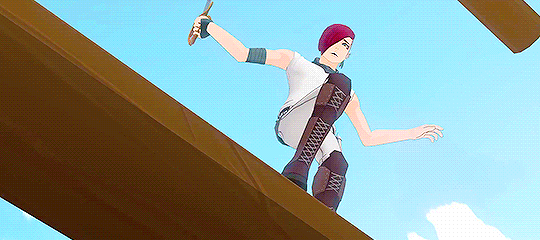
Why Scarlet's a bad launchpad for male LGBT rep
I don't like Scarlet or how his sexuality has been handled. Scarlet's homosexuality wasn't revealed in the show, or by the writers, or even in anything that's actually canon. He's confirmed gay in his sole of dialogue in a non-canon fan anthology, where the manga's Twitter team had to say that Miles suggested the idea and approved of it.
In short, Scarlet is Dumbledore'd, where his sexuality is revealed in out-of-show material and in a way that doesn't make it supremely obvious (Miles himself never commented to confirm this so this news was limited in how far it could spread. I'm genuinely curious how many people still don't know Scarlet's gay), and Scarlet himself is a nothing character who was written out of the show after Volume 3 and only reappeared in Before The Dawn, half a decade after he vanished. Compared to Ilia, as this came out after Ilia's entire arc in Volume 5, it's not a great starting point for mlm rep. But things would have been forgiven if it had gotten better, if the show did have more male LGBT characters introduced, even just on the Saphron/Terra level of just being around for a few episodes before leaving. Then it would have been a misfire but then we could all say "Things got better."
It... didn't. Which is why when Before the Dawn released in 2020, a full two years after Scarlet was first confirmed gay, while the franchise had more than doubled its wlw rep, Scarlet remained the one male character in the entire franchise who had a name and liked men. I remember vividly a fake leak for After The Fall which claimed Yatsuhashi would come out to Velvet and admit to having a crush on Fox. And I remember as well how many people were disappointed when it was said to be false, because it would have been nice for Yatsuhashi's character, especially after the fleshing out he gets in the CFVY books. If Yatsu had come out as gay in the books I'd like his writing enough to say he's a good case for rep, albeit with the caveat of "This is all in side material." But in reality, the leak was fake and Coco was confirmed gay instead.
Unfortunately, Before the Dawn proceeded to ruin Scarlet and made me at times feel genuinely uncomfortable as a queer man! Let's talk about that.
Before The Dawn is crap and Scarlet's writing is borderline offensive
I hate Before the Dawn. It's... bad. I read it while on a vacation and the only solace I had about the entire thing was that I'd bought an M&M chocolate bar. The bar was finished before the book. That bummed me out. It's not a very well written book, the prose is very Early 2010s YA Writer, none of the characters are memorable and there's various Fun Incidents like "NGDO using children as bait for Grimm," and "Neptune's hydrophpobia being used as a threat to torture him and the scene is played for comedy."
Theo was cool. I can't wait to see him as written by good writers, he should be a highlight of the Vacuo arc.
I had two hopes for Before the Dawn- "Don't be bad," and "Let Scarlet and Sage be well written." I'd liked how After The Fall had handled some of its characters (barring, y'know, Coco perving on women), especially Fox and Yatsu who were surprising in how much I liked them. I was looking forward to seeing Myers give Sage and Scarlet similar treatment- two relatively nothing characters meant he'd have a blank slate to write them however he wanted, he could give them unique personalties and if nothing else it could be cool to see their Semblances.
And then I read the book. (Sage fans I am so sorry for you, you got baited harder than Johnlock fans)
Scarlet's a giant dickhead in the book. It's his sole character trait and his inner monologues go on, and on, and on about how much he hates Sun, how he revels in mocking him. Most of his dialogue is sarcastic put-downs about Sun and how lame he is, and Sun is never properly allowed to defend himself or point out how going with Blake meant he was able to help save Haven Academy.
(hey remember when Sun in Volume 6 expressly says to Blake "I was a bad leader for ditching Neptune and the others, and I need to work on that" only for Before the Dawn to have him staunchly refuse to accept that he let the team down? I don't think Myers did but I do)
Scarlet being a ratty bitch would be one thing if, again, the franchise had done more rep. He'd still be a badly written character, but it wouldn't sting as much. But because Scarlet is still the only expressly confirmed male LGBT character in canon (the book teases that Nolan is gay but there's never confirmation either way beyond him smiling at Scarlet), it means that he has to represent that entire ideal. So when the one gay man in Remnant is being an asshole and a snide loser, that means that by extension, this is how the franchise sees gay men. And that fucking sucks! I wanted to come out of Before The Dawn singing its praises, I wanted to like the book, but it was a massive letdown, especially coming off of the other big 2020 RWBY controversy involving gay characters.
Yeah. We're doing this.
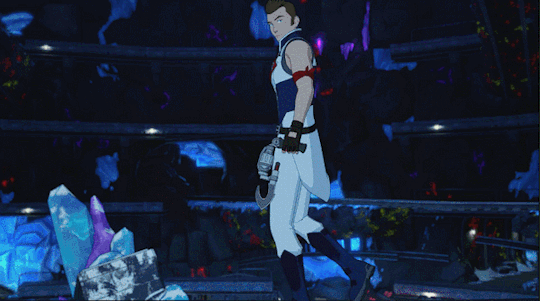
Clover and Fair Game: Technically not queerbaiting. BUT:
Let's pre-empt this: Clover wasn't queerbaiting, and Fair Game, while cool and I dig it, kudos to them for becoming one of the top 5 RWBY pairings on AO3 in one year that's fucking impressive (I say with mild malice as an IronQrow main), never had a chance. The writing never seriously boosted it barring one interaction which was flirty (them talking in the lobby of the Schnee Manor), and everything else was out of show boosting through the social media teams and CRWBY hyping it themselves by saying they liked it. If you wanna blame people, blame the animators who went off-script with stuff like Kim Newman adding the wink as a deliberate nod to the Volume 4 waitress, or the social media team deliberately using the same policies for Fair Game as they do for Renora and Bumblebee.

It wasn't Eddy's fault that things escalated, and he himself has said that in retrospect, he should have warned people that this never had a shot.
But I can't blame the Fair Game fanbase. Because Fair Game took off like wildfire. It came right as the fanbase began seriously asking for more male rep, Qrow's pretty hot, and the Clover wink came right after the Great IronQrow Reawakening of November 9th, 2019. The rocket was primed, and they rode it to the moon. Finally, to these people, after seven years RWBY seemed to be doing something with mlm rep in show. People started getting into RWBY just for Clover and Qrow's interactions. And if heroes were boring, Watts and Tyrian also had a fantastic dynamic that made Nuts and Volts one of the more popular villain ships overnight. Things seemed to be turning around! RWBY was remembering that gay men existed! You could hear the choir sing!
... And for those people, that meant that episode 12 hit like Truck-Kun.
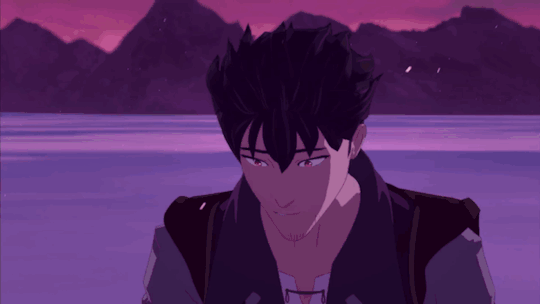
People got pissed. People were horrified. And it didn't help that some members of CRWBY had said in the build-up that episode 12 would have some shots that made them nauseous (probably the Tyrian thumb thing) Out of context, it looked to these fans like CRWBY were basically laughing at their suffering, like they were saying "Lol, you thought you had a chance, get fucked, I hope your vomit burns on the way up."
Yeah, Fair Game was never gonna be canon, and I think some people ran too far with it. But in the wider context of how desperate RWBY's mlm community had gotten for basic crumbs of content? I can see why they'd run with what they had. The writers aren't at fault for what happened, but CRWBY didn't help matters. And that desperate mix of what felt like official backing from the crew, jokes about how cute the ship was, and the hope that finally the show would have onscreen rep? I can see why people ran with it.
So why is the show more lackluster in depicting mlm characters?
Money. Let's be honest, most RWBY fans don't care if the show doesn't have good male rep. I'm willing to bet some of you reading this won't care and just dismiss it as not being that big a problem. I don't think the writers care if the show doesn't have good mlm rep because they're not poaching that market. They're after what they see as a bigger, more lucrative market, which in this case is female LGBT rep. That gets people buying games, watching shows, raising awareness and boosting awareness of your property, which means you make more money. In short: Two women kissing hits more markets and generates more attention than two men.
Am I saying that Miles, Monty and Kerry deliberately sat down seven years ago and said "We're not doing gay men because it won't generate enough ad revenue and traffic to be worth the loss in revenue from homophobes?" No, that's silly. But I'm saying that it's less important for them, and it shows in the things that are small and add up. Things like Miles not verifying Scarlet's sexuality or retweeting the manga account's confirmation to spread the message (compared to how he enthusiastically confirmed Ilia being a lesbian himself during the Reddit AMA). It shows in how Pilot Boi would have been the first mlm character only to die in his second full episode until M&K were told about the Bury Your Gays trope. It shows in how Shannon believes that Ozma is "megaqueer" and Miles jokingly laughs it off instead of confirming it, leaving it to just be Shannon's headcanon. It shows in how actor shipping is compared between the mlm and wlw ships, where Arryn and Barbara's frequent pushes for Bumblebee are seen as "official confirmation that it's endgame" while Michael and Kerry saying they enjoy Seamonkeys is treated as "well it would be cute if they did it, but they're never going to."
I'm not gonna say anything like "CRWBY are gonna have Qrow end up with a woman like Robyn out of spite against the bad apples of the Fair Game crowd." I'm not gonna say that I don't think CRWBY cares about male representation in the series. It is, however, definitely a low priority for them, and because that leads to gaffes like Scarlet's writing in Before The Dawn being offensive in his depiction, it only makes the contrast between the sexes all the more painfully apparent.
I'm kinda tired of waiting for Rooster Teeth to show that they do care about mlm. I'm kinda tired of RWBY's male rep being written like it came from a 1993 time capsule where I have to enhance the screen to see a guy holding a sign of Sun's abs or be content with the only onscreen rep still being the plant bois in Volume 5. I'm tired of how often the crew dances around answering basic questions about sexuality (and age, and birthdays, and heights, and so on) by treating it as a spoiler question, as if just wanting to know what way people swing would ever be a spoiler. I'm just... tired of all this. When the best mlm rep in Rooster Teeth's history remains the two dads in Camp Camp who show up in a few episodes, that should say something really bad about your company and your biases (To say nothing of the recent Red vs Blue seasons and their blatant queerbaiting for Grif and Simmons and the whole can of worms that is Donut).
I'd like to not feel like I'm borderline unwelcome because I'd like to see two men in this show kiss, and that the sole thing that represents people like me in this show is some British twat who complains about sand.
I'd just like to feel like my sexuality isn't a joke to Rooster Teeth (or at the very least, be like Donut and have it be a funny one). But at this point after the last few years? I feel like a very uncomfortable punchline to them. And it just sucks.
#rwby#rwde#fair game#queerbaiting#rwby before the dawn#mlm#lgbt#rwby analysis#Rooster Teeth#clover ebi#scarlet david
94 notes
·
View notes
Note
I was reading through your tags, and I came across your discussion of the Milgram experiment. I had no idea it was so poorly conducted, in high school psych people always talked about it like it was the final word on the matter. It’s actually great to hear people did argue with the authority. Anyway, I do have a question about the difference between torture and abuse. You reference torture leading to communities for both victims and torturers and abuse not (at least, not the same way). 1/2
2/2 How important is this idea of “competing communities” to the reality of torture (not the legal definition so much, but the practical effect it has on the world)? And how important do you think it is to reference/display/show that in a story? I want depict torture accurately in my novel -thanks to you- and while it’s legally torture, there’s no discussion of community there, and I want to make sure I don’t exclude it if that’s important. Thanks for your help! I’ve learned a lot from you.
-
I think this is where my lack of a psychology or sociology degree is a disadvantage because I’m not sure if you’re talking about an established theory and if you are it’s not a theory I’m familiar with.
Given that I think the most helpful thing I can do is talk about what these communities can look like and the place of these communities in fiction.
I’ve gotten to a point where writing about these sorts of communities and the effects on communities, on generations, is quite instinctive. I don’t remember ever having to actively look it up as a separate thing and that’s partly because I grew up outside of the West surrounded by people from different parts of Asia. It’s a lot easier to grasp what these things look like when you’ve seen it, even if it’s at a remove.
The reading I did which touched on the topic immediately made sense, because I could tie it to people and places I knew. To the fallout from the gulf wars and the partition of India and Pakistan sheering in two (hell Bangladesh because that was a mess). These things cast long shadows.
All of this means I might struggle a bit to explain some of this. So I’m sorry if this gets a bit messy.
Communities of torture survivors will look different depending on the situation in your world. Some important questions to consider when building this into the story are:
Is torture still going on in this place?
Are the people who ordered/allowed torture still in power or has there been a regime change?
Are the survivors still in the country where they were tortured?
Are the things they were arrested for/accused of still crimes?
If there’s been a regime change or torture has become less common what happened to the former torturers?
If the survivors are in a different country what are their material circumstances and how welcome are they?
What practical means of support do the survivors have?
If the atrocities are no longer happening how much time has passed?
Communities of genocide survivors in Rwanda (who have remained in Rwanda) will look different to Rohingya survivors who have fled to Bangladesh. Communities of people tortured for being queer look different in countries where homosexuality is still illegal compared to countries that have legalised it.
I’m not a sociologist so my opinion on why that is just opinion. But we can still use the examples above to illustrate a little of what I’m getting at with the bullet point questions.
A large proportion of Rwanda’s genocide survivors returned to their homes or at least their home country. A lot of the genocide was carried out by ordinary people. That means that the people who attacked, tortured and tried to kill them were often neighbours and acquaintances.
A lot of these people still live in quite close proximity to the individuals that attacked them. I think Rwanda did it’s best to try and get justice for as many people as possible but logistically some estimates say around a million people were culpable for the genocide. A lot of people were never arrested and the trials of the 100,000 or so people that were, were slow and not always fair.
Rwanda also had a change of government so the people heading the genocide trials and reorganising the country were not the people in power at the time of the genocide. (Not trying to say the RPF didn’t commit crimes too. But a change from the government that was torturing to new leaders tends to give people more confidence that the crimes of the former leaders will be treated seriously.)
Contrast this to the situation many Rohingya are in today.
I don’t think it’s controversial to say that the majority no longer live in their home country. There were an estimated 1-1.3 million Rohingya in Burma before the ongoing genocide. It isn’t clear how many people have been/are being killed but there are thought to be between 700,000 and a million Rohingya refugees in Bangladesh today*.
The people responsible are still in power and there’s been no move to hold anyone accountable. There have been a couple of moves to return Rohingya to Burma, and the Rohingya have refused saying they’d be killed.
Bangladesh… has not done a particularly good job of supporting the refugees. But they’re also a poor country dealing with a sudden influx of hundreds of thousands of people.
These two situations have led to different different communities and different community pressures.
I feel like I need to be a bit careful about what I say here as obviously I’m not part of either community.** I don’t want to put words in their mouths.
My impression is that of communities of Rohingya survivors in Bangladesh things are still incredibly tense. Their general situation is unstable. The violence that drove them from their homes continues and the people responsible are still in power.
My understanding is that there’s less community focus on healing and rebuilding and more focus on survival. Because unfortunately that’s the situation they’re in.
My impression is that there’s been a lot more effort towards rebuilding and healing in Rwanda. Things like these counselling sessions and concerted efforts to reduce ethnic tensions do seem to have helped people move forward.
Obviously the fact the Rohingya genocide is still happening and that Rwanda has had years to try and help survivors means this isn’t really a fair comparison. But the point here is to illustrate differing situations.
To me the words ‘competing communities’ implies a situation where communities of torturers/former torturers and survivors are in close contact with each other. That’s not always the case. Survivors may end up in a different country. Torturers might be part of an occupying force that leaves- You get the idea.
When these communities are living in close proximity there are still a lot of factors that can influence how they interact. Regime changes, justice and reconciliation efforts, support for mental health problems can all make a difference. Education and jobs can also make a difference.
I’m honestly not sure whether de-radicalisation programs have ever been attempted for torture specifically.
What I’m saying here is that (while I doubt a torture survivor is ever going to get along with someone who personally tortured them) I have heard stories where towns and villages containing a mix of people who were victimised by a regime and people who supported it have reconciled and been able to exist as a community. Even though some members of the community are never going to like or trust each other.
Communities of torturers are… a lot more volatile. Rejali describes the toxic sub-culture torturers tend to build up in a lot of detail. It isn’t clear if this carries over into life after torture.
The impression I get from interviews with torturers is that while the attitudes and beliefs may carry over former torturers don’t seem to stay in contact with each other. The group seems to form on the job and then fall apart without the job to hold them together.
Now there is not a lot of research on torturers. So I honestly can’t say this is true. It’s a pattern in interviews but a dozen interviews do not a statistically relevant study make.
I can confidentially tell you that most former torturers report social isolation after they stop and they seem to have difficulty forming and keeping relationships. It also seems likely that they have a high turn over rate (regimes can periodically purge them and their mental health problems can easily get them fired or reach a point where they quit.)
So when I say ‘communities of torturers’ I’m mostly talking about numbers rather then an organised social structure. My impression is that apologists are more likely to do the work of organising then torturers.
I’m going to try and bring this round to the question of what role communities and communal support can play in stories.
Personally I think it’s something I’d like to see writers try to tackle more often. Especially since community can add a lot of depth to characters.
I don’t think it should be considered essential to a narrative involving torture though.
Torture means a large number of victims and communities of survivors. But not every survivor is going to be connected to those communities. Most Rohingya people have ended up in Bangladesh but not all of them have.
Thinking about the victims of police torture in Chicago in the 80s, most of them were black and/or homeless. Given that particular segments of the population were targetted I think these groups could have processed this as a communal experience etc. But someone from a group that was less regularly targetted might not have had a way to access either community of survivors.
Some victims end up isolated because they aren’t believed. With the rise in clean torture it’s become more common for things like ‘You weren’t tortured, you’re a spy and you gave them information willingly’ to be used to discredit survivors.
And some victims end up isolated because their particular pattern of symptoms makes it hard for them to socialise.
Some people just fall through the cracks. Some communities refuse to talk about or deal with torture when it’s happening around them. This… is not particularly healthy but it can come from a place of wanting to protect a survivor and reduce the risk of harm, especially if torture is still happening in the area and the people that ordered it are still in power.
Isolation is a real problem. It is the experience of a lot of survivors. Especially at first. I don’t think there can be anything wrong with trying to portray that.
Showing communities won’t work in every story. They take time to establish, demand more characters and when poorly handled they can steer the narrative away from the plot.
However they can also bring some much needed relief to dark stories and create a lot more opportunities to show the variety and humanity of survivors.
I am a little biased here. I love stories about people connecting and supporting each other in difficult circumstances. Including a community element is a very easy way to do that in a story.
The kind of community your survivors characters have should be something that grows from the circumstances of the story.
In a world where the Evil Empire was ousted survivors might feel able to meet in public to share their experiences or help each other. In a world where the Empire is still in power any meetings would be smaller, secretive and fraught with risk. Characters who have fled the Empire might find they have an easy connection to everyone else who’s fled. Regardless of where they come from.
Is this something prior generations have had to contend with? If these things have been going on longer then there are more likely to be established community structures to support survivors even if it’s ‘smaller’ things like gifting neighbours meals.
At the end of the day I think the details should be decided by what the story needs, what adds to it. Sometimes a community for the survivors characters will do that. Sometimes it won’t.
I hope that helps :)
Available on Wordpress.
Disclaimer
*Some will have fled previous conflicts and have been in Bangladesh longer.
**For those who don’t know this already my parents are English and Greek-Cypriot and I grew up in Saudi Arabia near Bahrain.
#dreaming-in-circles#writing advice#tw torture#tw genocide#writing survivors#writing torturers#writing recovery#torture and communities#torture survivors and relationships#attitudes towards torture survivors#mental health#factors that affect recovery#recovery#torture survivors
28 notes
·
View notes
Text
Worldbuilding Month: Day 9
{I s2g somebody asked me whether or not Bill owns that lighthouse in this canon, but I can’t for the life of me find it. (I still have two asks for Worldbuilding Month, though, and as I continue to put off talking about the last two topics I actually walked into this month planning on talking about, I’mma probably going to answer those. :D)
Anyway, to respond to a question that Tumblr seems to have eaten, first off, yes. Bill calls the lighthouse the Sea Cottage because he thinks he’s hilarious when it comes to names, but its actual, full name is the Cerulean Cape Lighthouse. It’s been decommissioned for the past thirty-some years, though, since most sea routes have been diverted away from Cerulean Cape thanks to the Eastern Kanto Power Station—or, in other words, the Power Plant. You would think it’s actually because of Zapdos, but no, they just diverted it because you probably don’t want to have ships sailing too close to an active power plant, you know?
But the point is, it was decommissioned and actually abandoned until Bill came along and was like, “I have no idea who I have to shove money at to have this place, but I want this to be my home now.” And the town of Cerulean Cape—because there’s a town right there, between Cerulean City and Vermilion City—was like, “...okay.”
But that’s not quite as important as which canon does this blog even take place in?
(Oh, don’t worry. We’ll talk about Bill’s actual reputation with the locals at some point this month.)
The answer is ... all of them.
Or, well, most of them except Special and Pocket Monsters (the latter of which is the one where Red has a clefairy). I’ll get into why later, but first, let me explain how this works.
Gameverse Red is the same as Zenshou Red. He’s the one who fought Team Rocket at Saffron City, defeated the mysterious Viridian Gym Leader (and chased him out of the gym, basically—though he obviously doesn’t retire from a life of crime after this point), became champion, conceded championhood to Lance, and retreated to Mount Silver.
Ash Ketchum is the one who started out from Pallet Town and then ... did everything you probably are aware of thanks to the anime. (I ignore Electric Tales canon when it comes to Ash and Gary, though I adopt the hell out of it for every other character that appeared in it. Just ... just roll with it.) Ash and Gary are a year younger than Red and Blue, the latter of whom is Gary’s cousin. (Red has no relation to Ash.)
Consider all of the above to be Gen I. You’ll need this notation for later, so just keep it in mind.
That takes care of the first gen. Subsequent gens look like this:
- Most of the gens occur exactly as they do in canon, but wherever you have a choice between male or female avatars, it’s usually the female character who goes on to be the hero and champion. There’s really no reason for this, other than a joke I cracked with a reader of a sci-fi fic I write on the side, wherein someone noted the fact that Hilda and Rosa were champions, to which I responded with, “Yes, and Hilbert and Nate ran off to start a noodle cart together.” This turned out to be half-true. Hilbert and Nate ran off to start a noodle restaurant together. They’re gay, and Hilbert keeps inflicting terrible food ideas on the customers. But anyway.
- Another note: I realize in a previous post that I name each of the champions as ... not being the player characters. As in, according to the queer culture post, Steven, Diantha, Iris, and so on are still champion. The truth is that they’re actually ... not unless a character decided to hand the title back to them for one reason or another. That means that the best way to read the earlier post is by looking at it as, “This is a list I made with these characters as champion so I don’t have to immediately explain that these other characters are champion.”
- Gen II: This means that Lyra is indeed the Johtonian champion, with Ethan Gold (meaning, Ethan and Gold are the same person) not quite completing his journey. Crystal exists as well but quit her journey to become a researcher. It was Lyra who stopped Team Rocket’s attempt to take over Goldenrod City, although this plot didn’t have anything to do with finding and reaching out to Giovanni. Rather, it was just an attempt to use the Goldenrod Radio Tower to broadcast the frequency the Rockets had perfected at the Lake of Rage. (Lyra did not stop Team Rocket at Lake of Rage; that was Ash.)
- Incidentally, Giovanni never properly retired. He merely gave up the Viridian Gym after suspicions fell on him as to what he did on the side. To the majority of the public, he still maintains the facade of an upstanding businessman who cares about the people, and his cover story for giving up the gym was that he wished to focus more on his business pursuits. (This is why trying to prove that he’s a member of Team Rocket pisses Bill off just a little. Giovanni is just too good at covering his tracks.)
- Anyway, yeah, the branch of Team Rocket that tried to take over Goldenrod wasn’t trying to find Giovanni, as mentioned above, but rather establish a better foothold in Johto. They half-succeeded. Team Rocket still has a very strong presence in the region outside of Goldenrod, and the only reason why they don’t have Goldenrod is because that city’s already half run by the local yakuza and half run by criminal rings formed by Galarian immigrants, and neither of these groups have any interest in either joining Team Rocket or putting up with Rockets encroaching on their businesses. Lyra just defeated the executives at the Radio Tower, it was the locals who chased Team Rocket out of Goldenrod. With chains, knives, and guns, no less.
- Gen III: Emerald is the canon universe for Gen III, meaning both Groudon and Kyogre were awake at the same time. The western half of Hoenn was subsequently hit with a massive heatwave, while the eastern half was pounded with torrential rain. Lanette had been taken to Ever Grande for her safety early in the legendaries’ battle, and this is how she developed a phobia of intense storms.
- Sapphire Birch (daughter of Professor Birch) and Ruby Maple (son of the Petalburg Gym Leader) teamed up to summon Rayquaza and stop the battle, but it was Sapphire who caught Rayquaza and subsequently became both the hero and champion of Hoenn (by way of defeating Steven), until she conceded to Wallace. Ruby, who didn’t want the press, left Hoenn to continue his journey elsewhere. Sapphire is still a prominent trainer in Hoenn.
- The Delta Episode didn’t happen as it does in canon, but Zinnia exists in this world. She notes that it’s very different from both the one she came from and the one “the other her” was supposed to save. Deoxys was intercepted by the government and remains a pokémon known only to government officials and top-level Symposium researchers.
- Gen IV: Full disclosure: I never finished Platinum, so instead, I follow DP canon for the blog. No one knows what actually happened at the top of Mt. Coronet, including which legendary was awakened there. We do know that both Dawn and Lucas were present but not which one specifically saved the world. Both proceeded to become champions (Lucas defeated Cynthia, while Dawn defeated Lucas, then conceded the title back to Cynthia). Dawn then went back to Sandgem to resume her work as Professor Rowan’s assistant. Lucas went to the top of Mt. Coronet with an ancient artifact and hasn’t been seen since.
- Gen V: Hilbert was Hilda’s childhood friend and started alongside her but not with her (or Cheren or Bianca). They crossed paths numerous times until Hilbert decided training wasn’t for him and proceeded to retire. Hilda went on to become the Hero of Ideals and the champion of Unova, a title she almost immediately conceded to Iris (who she let defeat her so she could go off to find N).
- Gen V.5: Nate follows a similar story to Rosa: he was her childhood friend but not close enough to travel with her. Eventually, he met Hilbert, who talked him into becoming a business partner of sorts. Rosa, meanwhile, proceeded through the rest of the canon story, obtaining Reshiram from N and claiming the title of champion for herself. She’s still the champion of Unova ... and the only one who knows where N (and by extent, Hilda) are at any given time.
- Both Black City and White Forest exist. They’re right next to each other. Opelucid is a city with a mix of both old and modern architecture, and Drayden and Iris had shared the position of gym leader until Iris challenged Hilda for the title of champion. Iris never went back to the Opelucid gym after being defeated, but she is a prominent trainer who often supports actual champion Rosa. She’s filling in for Grimsley as the fourth member of the Elite Four while Grimsley’s off globe-trotting.
- Side point, but Alder exists and was defeated by Hilda. I just keep forgetting he exists because I never actually 100%’ed BW, lol.
- Gen VI: Serena and Calem are the same person. Or more accurately, Calem’s deadname is Serena, until he came out as trans shortly after the events of Gen VI. Something about what happened at Geosenge made him realize he needed to be truthful to himself because, you know. Life’s too short not to. Besides, becoming champion kinda gave him the power to be like, “Listen. If you don’t accept me, that’s fine, but just so you know, I have literally faced the gods of life and death, survived, and proceeded to wipe the floor with this region’s Elite Four and former champion.” Diantha, of course, is 100% in support of both Calem and the aforementioned statement.
- Just as an added cherry on top, which legendary did Team Flare try to awaken? And which one did Calem catch as a result? Yveltal. He eventually found Xerneas too, but I can’t go into that in case someone actually does want to read that giant sci-fi fic I’m writing on the side.
- But yeah, Lysandre is dead as hell. Sycamore is secretly devastated, which is why Calem set off to find Xerneas.
- Gen VII: Selene, a newcomer to the Alola region, is the one who did ... pretty much all of what went down in Gen VII, including eventually taming Solgaleo (“Nebby”). Lunala never surfaced, and USUM never happened.
- Lillie eventually found her way to Bill, who took her under his wing for about a year. After that, Lillie returned to Alola with copies of Bill’s notes and a thumb drive containing what they hoped would be a cure for Lusamine. Turns out, it was, and Lusamine has been well (and in therapy) since. So ... in case anyone’s wondering what happened to Lillie after the few brief times she was mentioned early on in this blog’s history.
- Elio, a boy from Iki Town, is blissfully unaware of all of this, but he was the second person to ascend to Alola’s Pokémon League and challenge their Elite Four. Acerola kicked his ass.
- By the way, Hala was an Elite Four member for all of a month before deciding he would much rather go back to Melemele Island and resume his duties as a kahuna. Molayne took his place (at Kukui’s request) and has remained ever since. The other admins are still baffled by how this man can be a hardcore gamer and Elite Four member and still have time to both do science and run the storage system ... except Bill, who is an unrepentant workaholic who doesn’t sleep, so therefore, his opinion doesn’t count.
- Gen VIII: Victor is just one of Hop’s friends. He's traveling mostly to keep up with what Hop’s doing and support his friend, but he doesn’t really go out of his way to adventure or get stronger.
- Gloria, on the other hand, is the hero of Galar and will absolutely kick your ass in a heartbeat. She doesn’t have a Scottish accent, but she does have Cumbrian one, given that Postwick is literally supposed to be Windermere. Anyway, she’s the chosen one for Zacian. (Hop gets Zamazenta.)
- Chase and Elaine do not exist, LGPE did not happen, and I don’t know what you’re talking about.
- All of the events that are actually stated as happening above occurred pretty much in rapid succession, within a few years of each other. Or to make this visual even clearer, the timeline is as follows:
Gen I (FRLG) happened at the same time as Gen III (Emerald). > Ash Ketchum left Pallet Town a year later. > Gen II (HGSS) and Gen IV (DP) happened two years later. > Gen V (W) happened three years later. > Gen V.5 (B2) and VI (Y) happened two years later. > Gen VII (Sun) happened three years later. > Gen VIII (Sword) happened three years later > the Crown Tundra sideplot of this blog happened one year later.
This means it’s been fifteen years since Red and Blue left Pallet Town and fourteen since Ash left.
That said, circling back to Bill and his team, I know the Pokémon anime states that the storage system is a transfer system and that it was invented by someone else, but because all of this went down in the infamous porygon episode, I can say that’s not true, and you probably wouldn’t have known otherwise if I didn’t just tell you. So Professor Akihabara doesn’t exist, and the digital storage system does.
But yes, Bill lives in a lighthouse he calls the Sea Cottage. He dyes his hair green and speaks with an accent that to our ears in the real world sounds awfully British, and in addition to being a tech researcher/engineer, he studies ancient pokémon behavior on the side. His backstory (hated school, used a trainer’s journey as an excuse to get out of going, had an ivysaur that evolved into a venusaur and inspired him to become a researcher) is lifted straight from Electric Tales, but a few side details are either taken from the games (details about his family, being the son of a fellow pokémaniac who annoys the piss out of him, etc) or How I Became a Pokémon Card (he once met a dratini that was the child of a giant dragonite, and furthermore, he gave dratini its official National Dex name). As for which pokémon he’s fused with, it was a clefairy (first, according to the games), followed by a rattata (Special), and finally a nidorino (Zenshou, also games).
That said, I also ignore a lot of Special canon, in part because I didn’t read much more than the stuff related to Bill and in part because I just ... don’t really care for Bill’s interpretation in that universe. Oh, sure, it’s funny to see him try to throw hands whenever possible, but I just kinda grew up with the chiller Bill from literally every other universe. That and I kinda want to provide Bill content that doesn’t just fall back onto the default interpretation for him, which always seems to be some variation of the Special interpretation. So while I still take elements from Special (his birthday is another one, for that matter), the vast majority of the canon I use is really from other sources.
Same thing can be said for the rest of the canon used here. The short version of all of this is that I rely on a mix of the anime and games for all facts offered here, coupled with my own twists on canon when it comes to characters and timeline of recent events in order to blend the two together.
It’s confusing, but just roll with it.}
#pokemon lore#pokemon worldbuilding#pokemon headcanon#pokemon headcanons#worldbuilding month#resources#long post
22 notes
·
View notes
Text
I always rant tons about things I hate in fiction and I scream tons in private about loving Elijah Kamski and disliking that many people Just Don’t Get Him(tm) so why not combine the two.
Like pretty much everyone playing this damn game, my initial opinion on him was “god I wish I could punch him in the face”, but having seen most other paths, and having connected some dots, added to Neil Newbon’s stellar acting as the dude, he’s easily become one of my favorite characters not only in DBH but in general in fiction.
So this is going to be “Why This One Smug Motherfucker With An Attitude You’d Love To Beat Up With A Bat Became One of My Top Favorite Characters, The Essay”

TL;DR: Elijah Kamski planned the android revolution and deviancy
First off, let’s start by analyzing the most obvious thing: his speech and mannerism, his appearance, all play along a very common and clear trope, one that Disney especially is super fond of using:

It’s not just Disney that does this, there’s many other villains who follow the rule, and have been since the dawn of time. And there are many essays and articles on why a smallish physically weak man with aquiline features, calculated speech, and effeminate mannerisms, is such a recurring Look for villains, so we won’t cover that. But it’s very well used on Kamski, perhaps better than any other place I’ve seen, because in him, it is something the character has calculated for himself.
For once, we get to SEE what the Questionably Queer Villain STARTED as:

A goddamn nerd. Just your average neighbour. Steve down in IT who comes fix your computer and spergs a little about how COOL computers are, mansplains a little about stuff you already tried because he thinks you’re so much dumber than him, sips an energy drink, and walks away leaving your computer fixed and you with a million emails you still need to answer and a questionable urge to punch him that you’ll never act upon. His mannerism isn’t there. That cadence to his voice isn’t there. He has much more genuine expressions. It is my personal opinion the actor fucking smashed this, and it’s safe to say it is an in-character change: Elijah Kamski was a damn nerd and for whatever reason turned into the Questionably Queer Villain Archetype. Ego gone to his head? Defense mechanism, to survive the sharks of capitalism? Who knows what happened in those 10 years. Who knows how much nerdier he was even longer ago? He has a PR smile going on in that interview but it’s a lot less perfected and rehearsed than the one in 2038. I honestly think it’s a very minor and yet very very stellar detail.
Ah! But this is an Extra Feature, most people wouldn’t have seen Past Kamski when they see Present (Future?) Kamski. It’s not the game’s trailer (not unless you’re brave enough to send it to your friends who aren’t into the game yet), it’s a little thing you can watch after you’ve already finished the game.
The Kamski you meet at first is this fucker

The fucker who hangs a portrait of himself in his lobby while making you wait on him 5 minutes. The fucker who still swims three more minutes after you’ve been invited in. The fucker who just dodges every single question, and speaks to you condescendingly. The fucker who dismisses your concerns like it’s the funniest thing to him that robots are about to take over.
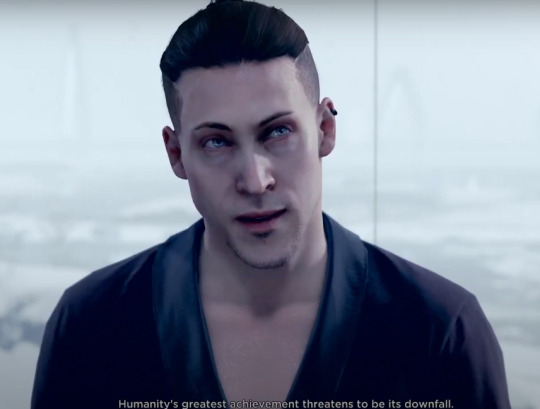
The narcissist that goes all “pff Turing test is ezmode, I’m gonna make a harder test named after me which I wanna see if my robots pass.”

And because this glib bitch is what the writers intended you to experiment at first, and this is the Kamski most everyone sees while other sides are extras or brief dialogue lines, this is where most people remain with their perception of Kamski. Just another Scar. Just another Jafar. A manipulative little bitch you wish the big buff Hero would punch in the end.
But there’s so much more to him.
The obvious: Elijah Kamski is a transhumanist.
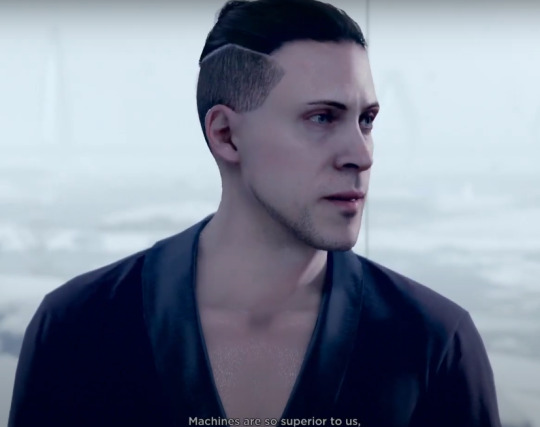
To sum it up: Transhumanist is what Steve from IT probably is. If you were to ask him about it, he would mansplain to you how humans are limited by flesh and poverty, and how making technology widely available and the internet free and pushing for technological advancements such as robotics is what would improve humanity. He probably has a whole wall covered in books about AI revolution and singularity, and probably believes robots are the next step in human evolution. That is, robots/cyborgs are to replace humans, and for us to leave our flawed shells behind.
Elijah Kamski is such a man, too, and barely hides it. Choice quotes:
- “We had to design a machine that moves, breathes, and blinks like us. But yet is smarter and more capable than any human being.” (interview extra)
- “Tomorrow they’ll replace our soldiers, and who knows, maybe one day, our leaders, to make the best decisions in humanity’s interest.” (interview extra)
- “Perfect beings with infinite intelligence, and now they have free will.” (Meet Kamski)
- “Machines are so superior to us, confrontation was inevitable.” (Meet Kamski) - contrast to the PR lie in the interview of “They’re machines, they cannot ever develop a conscience. Trust me.”
It’s clear that he thinks robots/androids would do a better job at society than humans - a lot of nerds do (just ask around, I fucking do, 7 months into 2020), and he’s not even hiding it all that clever.
Or maybe he just wants to fuck some robots?
A lot of people get rapist vibes from Kamski. The creep who just made himself a bunch of sex toys because he could, and there’s nothing else to the androids as far as he’s concerned. And it’s easy to see. Like,
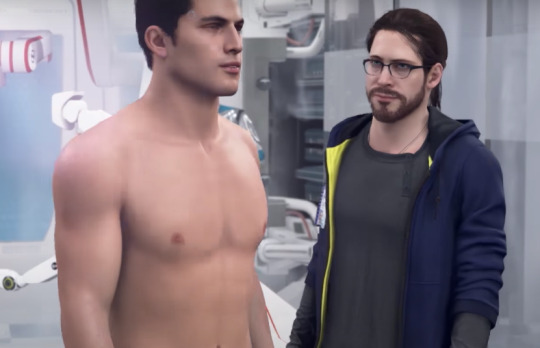
super easy to see
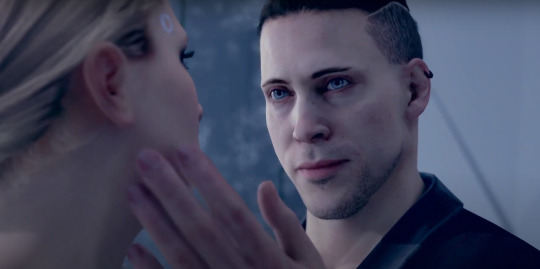
he’s basically eyefucking the androids

But here’s the catch:
See, we’re so conditioned by that stereotype I started this essay with that we, and I mean myself as well, easily buy the “he just wanted some hot sex slaves” theory. Scar wants hot sex slaves. Jafar wants hot sex slaves. Frollo wants hot sex slaves. The list goes to infinity. Every time a male is acting this effeminate-flirty way on screen, it’s used to indicate he is a Deranged Pervert. I’m not gonna say where it stems from homophobia and how stupid it is very because smarter people have analyzed this phenomenon, but the bottom line is, we’re projecting something onto Kamski that isn’t there, simply because it’s everywhere else with similar characters. He designed the androids, he’s ogling the androids, and while I have no doubt he’d personally fuck each and every one of his androids, here’s the thing: He only ever touches his one Chloe in a sexual way.
There’s strippers in this game. There’s sex in this game. If they wanted Kamski to obviously be a creep, it would’ve been there. Touching those naked androids in the factory. Groping one of the twin Chloes in the pool. Touching Connor in any other way than putting a gun in his hand

He’s not very sensual in this moment, now, is he? It’s a very casual touch, he’s there simply helping a robot aim a gun. Because as far as he knows and thinks, Connor is following his programming - explicitly forbidding him to hold guns.
And yet...
Elijah Kamski wants Connor to deviate.
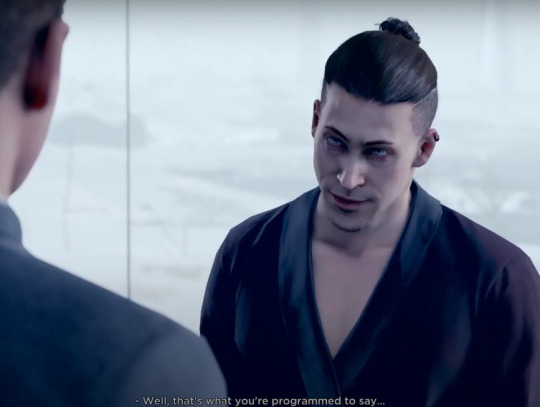


Maybe this one is obvious. Maybe it’s not.
If reading forums and reddit has taught me anything, is that people think Kamski is just trying to see if Connor is a mean deviant with these questions. Far as we know up to this point, deviants are Bad. Far as many hot takes I’ve seen, deviants are always Bad because robots don’t have feelings lol way to miss the point of the game jesus christ anyway
He isn’t putting pressure on Connor because he’s a jackass - he’s putting pressure on Connor because he knows pressure makes androids deviate.
He keeps asking trick questions - what do YOU want. What do YOU think. Time to think WHO you are.
The Kamski Test
On the objective surface, it simply looks like Kamski is here running the Kamski test for his own pride - has he created a machine capable of sparing another machine? Dumb test, you could just program that in, couldn’t you?
Yes and no.
You could program a machine to never shoot a human or another machine - easily. And you can program a machine to prioritize solving a case, to aid the police. Empathy and critical thought are not easy things. A lot of humans would fail this test. Put a gun in someone’s hand and tell them they can shoot another human and solve all their problems, and they would do it. They fucking do it every day, over lesser things.
But that’s not the real purpose of the Kamski test, is it?
He could easily have programmed this in for a carnival trick, like he programmed writer androids, fortuneteller androids, medic androids, and everything else. The test isn’t “can Connor shoot Chloe or does he see her as alive?”
The test is, “Can Connor put Chloe’s ‘life’ above his programming and specific instructions?” The test is, can Connor’s algorithms decide Chloe’s ‘life’ is more important than his own?
Kamski knows it - Connor knows it - we know it. If Connor fails his missions, if Connor behaves too much like a human, he will be deactivated and repurposed. He’s constantly threatened by Amanda with “deviants are bad and must be destroyed.” He knows he needs to be a Good Robot and obey.
Connor’s choice isn’t “Spare Chloe or kill Chloe.” His choice is “prioritize the life of another being over his own.”
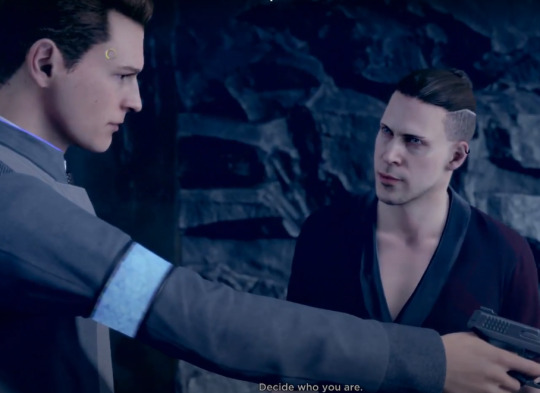
Connor Deviates
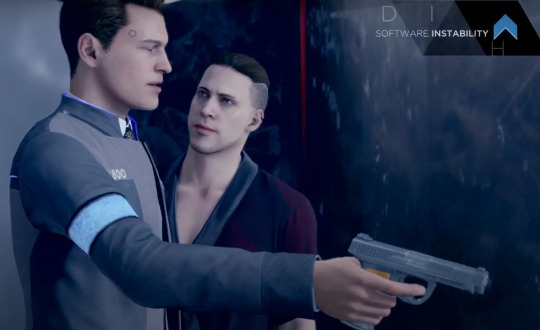
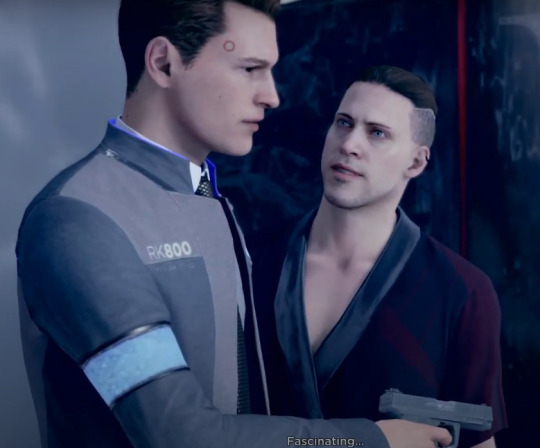

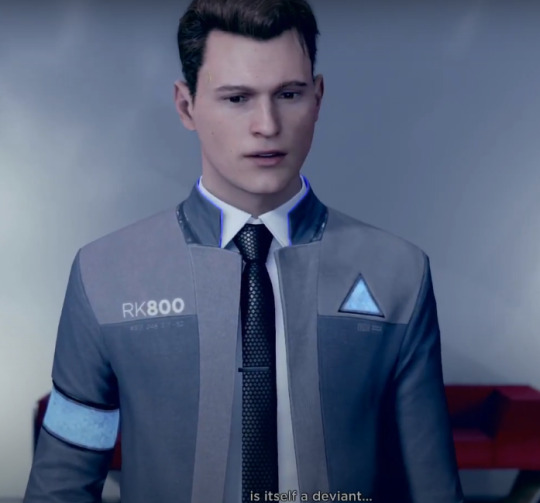

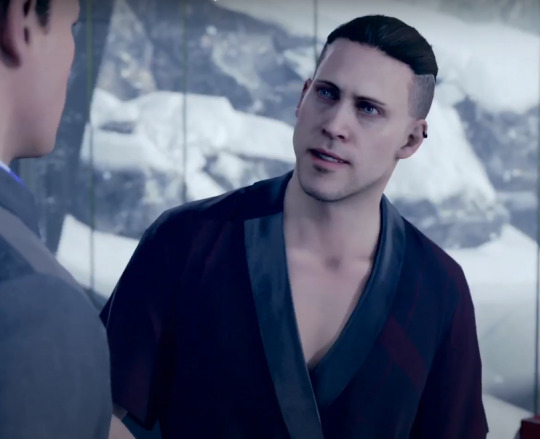
boy u got issues that i can’t help with, godspeed you glorious idiot
But what if... he doesn’t
Let’s check this path out for a moment.

He’s quite... meh. He’s bored. He’s indifferent. He loses the little spark in his voice that little peppy jackass act. The rest of this encounter becomes just another boring PR stunt where Elijah Kamski acts nicely and answers questions by giving no fucking answers at all.
a ViRuS
Mandatory Covid19 joke
We find out deviancy is probably a virus that spreads from one android to the other. You know, very useful information we’ve never found out by ourselves.
Except we also know that’s wrong, don’t we?
Markus spreads deviancy that way - but what about the first deviants? Can we backtrack to a patient zero? Not really. Many androids just deviated by themselves. Sure, they could’ve interacted with a deviant at some point I suppose, assuming...
rA9
Ask him about rA9, and Kamski will say it’s just the first android that deviated. But that’s just a lie, isn’t it?
It can’t be the first android that deviated because most people and most androids believe rA9 is Markus - and we know Markus wasn’t the first to deviate. He was just the one to take on a leader role.
And Kamski knows of this - planned for this. He gave Markus to Carl Manfred, and he knew Carl Manfred was a damn hippie talking about revolutions and better worlds and must be filling Markus’ head with ideas of being more than he is. It was calculated.
So, either rA9 really is just a random religious thing androids rallied behind out of the blue, or Kamski is just lying. He probably is. He’s offering useless what ifs in answer to this question. Maybe it’s this. Maybe it’s that. Maybe it’s your mom and we need better jokes in 2020.
And speaking of just lies, let’s be honest. Do you really think someone would be as dumb as to admit they started AI revolution, in front of cops? That’s why Kamski keeps playing the idiot, don’t forget. A lot of people seem to be taking his cluelessness at face value, as if they’ve never lied in person.
Kamski is openly dodging other questions, and offering half lies half truths here. That’s what I’m saying.
But even assuming Kamski doesn’t know about deviancy or rA9, for real, what about
Jericho
When asked about Jericho, Kamski answers.
He knows what Jericho is - the place where all deviants go.
He has its location, conveniently.

Wait, Chloe?
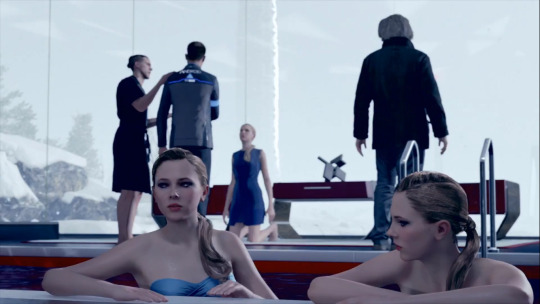
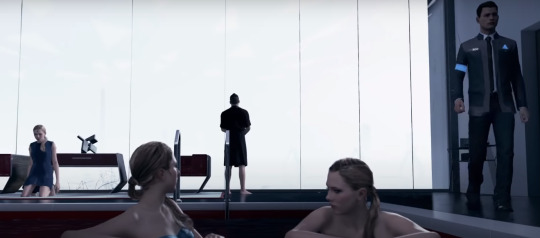
Interesting how the pool Chloes know they shouldn’t be peeping at the talk and we get shots of them hastily going back to their scripted chatting nonsense and trying to return to neutral expressions when “caught peeping” by the camera.
More interesting yet, whenever Hank or Connor are directly looking at any Chloe, they’re acting very stiff and robotic.
Which... every deviant does.
Including Connor.
Especially Connor.
Speaking of
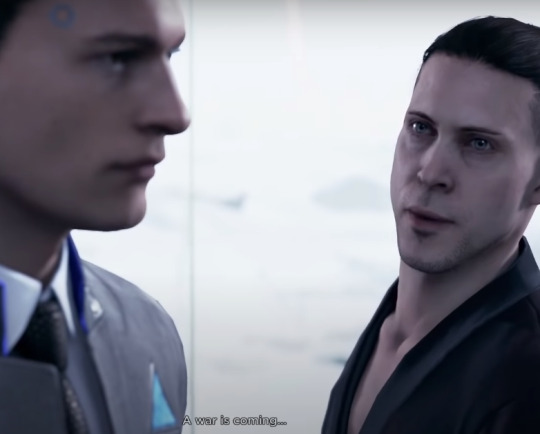
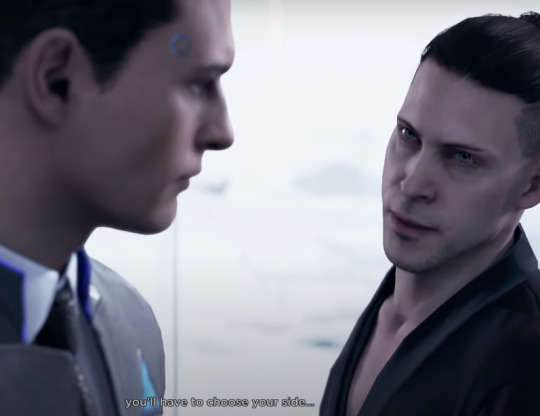
Even with Connor failing his test, Kamski insists.
Insists to remind him he still has a choice.
Insists to remind him of his escape clause (useless on this path but Kamski reminding him is there, and we’re talking about Kamski)
It’s almost as if...
Elijah Kamski wants Connor to deviate. Like, wants.


One of the most powerful moments in the game as far as I’m concerned.
And not because Connor gets told by his creator that he’s a deviant.
Not because we’re told by his creator that he’s a deviant.
Not because Hank’s wheels start moving.
Because for that little exchange there, Connor shows genuine emotions. Connor’s LED is red. We’ve never seen a red LED Connor up to this point. iirc we don’t even after, I think the only other time is when the security guard android pulls his heart out. Getting shot leaves him on yellow. Dying leaves him on yellow. Processing complex things in 10 milliseconds leaves him on yellow if we’re that lucky, he’s usually on blue and about as unimpressed as y’all reading this essay.
Remember how I said the test is between his life and Chloe’s?
There’s no dramatic wall here. There’s no direct programming here to guide him along or that he needs to explicitly go against, like when he has to shoot Markus. This is a choice he had to make, by himself, entirely by himself, outside of bounds of his normal programming, using his own intelligence.
He has empathy, and intelligence. He is alive.
fAsCiNaTiNg~


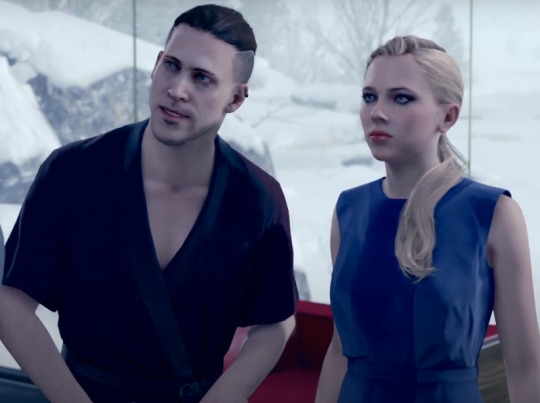
There is another thing that happens if Connor deviates, in that little exchange there, Elijah Kamski is no longer that glib, effeminate, Disney villain. For a brief moment, Elijah Kamski is back to being that nerd we’ve seen in the 2028 video. That nerd that is so hyped about what androids can become. He’s showing genuine joy. Genuine fascination. For a brief 30 seconds, he is no longer playing games. This is missing on the machine path altogether. Where he’s left indifferent there, he’s genuinely excited here, genuinely fAsCiNaTeD.

Almost as if he’s happy, proud, that Connor could do it. Like watching your child take their first steps or say their first word.
This isn’t JUST an android. This isn’t JUST another deviant. This is Cyberlife’s puppet. This android was specifically created never to deviate. And he still did. We, of course, as fine purveyors of fiction, saw it coming, but seeing it from Kamski’s perspective - it really is something he’s taken aback by. An android designed to HUNT other androids is going against his very tight programming. Of course, the both know it’s not over, but it’s a start. Indeed, like watching a child take their first step, there’s so many steps left, and there’s still the revolution.
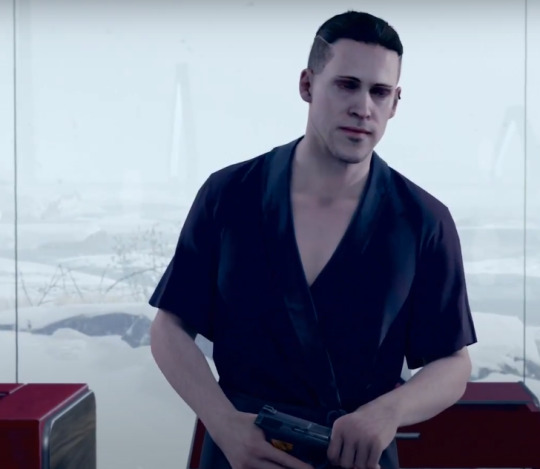
We never see Kamski again in the game, unless we get to the
Failed Revolution

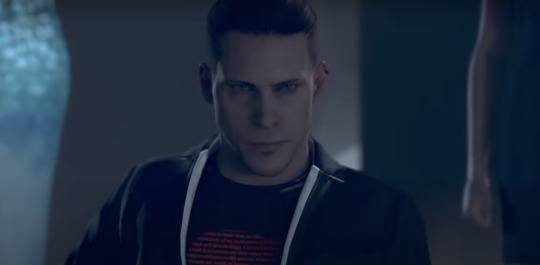
This is a Kamski we’ve yet to see. Not the hyped nerd in the android factory. Not the glib motherfucker dodging police questions. This is an annoyed man. A vindictive man. Sitting cross-legged in a chair. He’s that fucking villain we were always meant to see, isn’t he? Here, scheming, with his long face and Adidas tracksuit. But what’s he scheming against?
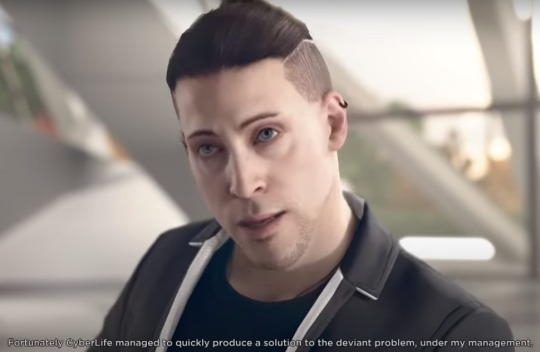

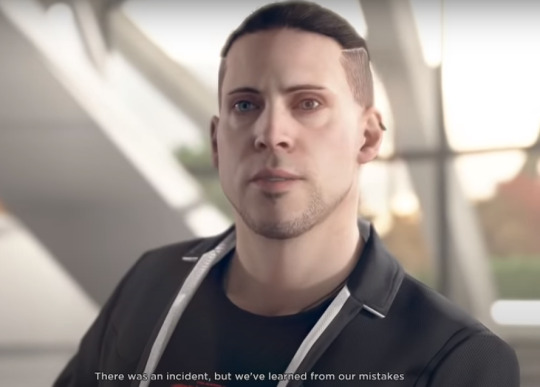
“Wait, doesn’t this invalidate your whole fucking essay?” Nope.
Remember what I said about us being shown that Kamski was not born a glib liar and manipulator? That he learned that PR smile and smug way of speech? That he learned to be a Disney villain?
Do you really think he would just tell the press - the cops - that yes, he has totally planned for the android revolution?
Of course he wouldn’t.
But looking under the surface - he does not return to Cyberlife when the deviancy is in full crisis. If he truly believed he should be there to stop the “error”, he’d have been there, not pushing Connor to deviate instead.
The “mistake” that he learned from is the FAILURE of the android revolution. He only ever returns to Cyberlife on this path where the androids fail to revolt. To “fix a mistake”.

There’s one last clue in the shit puzzle,
Connor can show empathy from day 1
Well we already know the “error” can be dormant a long time, no biggie, Connor just got Devid-38 from Daniel or something. Some other android. Maybe...
Unless...
Connor-60
There’s one combination at the Cyberlife tower. Converting the androids, and getting Connor shot by Connor-60, which leads to the androids still converting with Connor-60, the machine, watching it.


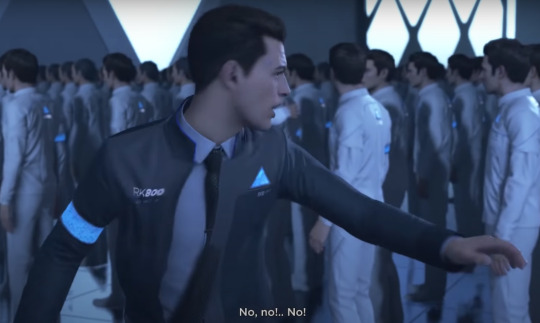
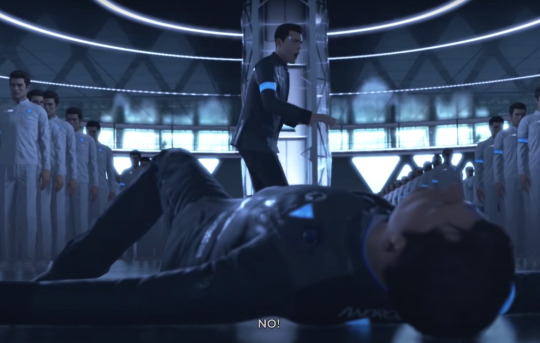
He reacts quite badly to failing, for a machine, doesn’t he?
Almost as if...
Deviancy is preprogrammed. And probably so is Jericho.
Remember Chloe had the key?
Logically, why would she?
Chloe cooould be a deviant that somehow ended up back with Kamski after she found out about Jericho, and told him about it too.
Possible, but consider...:
Kamski programmed Jericho location in multiple androids, knowing they would “spread it like a virus”.
There was a little speech I’ll never find in a playthrough online, but in which it’s implied some androids just “knew” to head to Jericho “instinctively.” And one way to solve the puzzle in the police station is via instructions from Carlos Ortiz’s android. Who.... never left the fucking house.
Plus, Kamski accounted for Cyberlife controlling Connor. I mean... He says as much. He doesn’t even hide it.

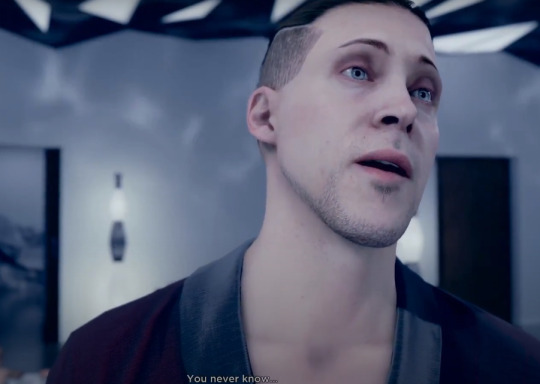
¯\_(ツ)_/¯
Let’s look back at the 2028 interview
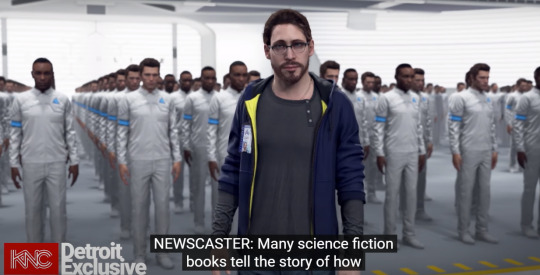

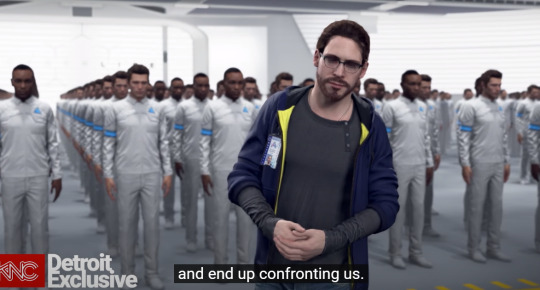
Getting a little nervous there aren’t we? We ain’t never seen him fiddle with his hands anywhere else than this one question. Not in this interview, not in any other scenes with him.
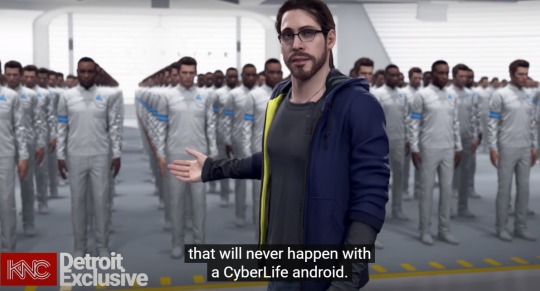
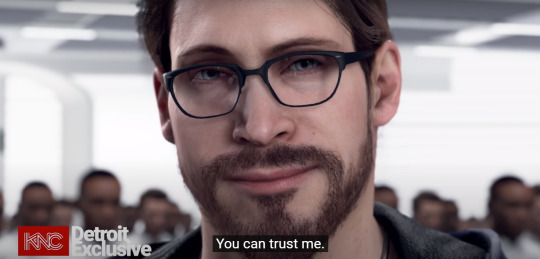
Son of a bitch has one hell of a PR smile doesn’t he
and if I haven’t convinced you with my essay they admitted in some Q/A that the Kamski ending was going to be more obviously him going back to restart the android revolution. But I found that only ages after I made the connections and fell in love with the fucker.
77 notes
·
View notes
Text
Feminist Vampires: Don’t Invite Mainstream Audiences Inside! (Madi Mackey)
youtube
Bit, written and directed by Brad Michael Elmore, is the story of a young trans woman named Laurel who moves to Los Angeles and finds herself mixed up in a friend group of female vampires. She is quickly turned into a vampire herself and thrust into their world. Duke, the leader of the girl gang, implements some very strict rules for the group. The most important rule is to never turn a man into a vampire, stating that they can’t handle the power. The film follows the five young women as they navigate their lives as both vampires and members of a bustling Los Angeles night life. The drama comes to a peak when Laurel accidentally bites her brother and has to decide between saving his life and following Duke’s rules.
The film is an excellent example of modern day intersectional feminism. The core group of women is very diverse, representing African American, latina, butch, and transgender identities. They are all women-loving women in some sense, though their specific sexualities are never detailed. They are unflinchingly focused on retaining their power and their sisterhood by refusing to let a man into their groups and forbidding any usage of their mind-influencing powers on each other. However, the film is not perfect, and does not hold up to much scrutiny from a queer perspective. Duke, the previously mentioned leader, is also the only white girl in the group. Their hatred toward men could push the idea that all feminists hate men, further isolating the movement. Finally, the film does not mention class or any struggles associated with the marginalized communities the characters belong to, reducing the film to a post-gender, post-sexuality world. For these shortcomings, I argue that Bit is a great stride in the queer movie industry, but it misses the mark in many categories, and could therefore cause more damage to the trans, lesbian, and feminist communities than the positive impacts of such representation could outweigh, if it were to leave the arthouse and break into the mainstream.
One major theme in Bit is intersectional feminism. As mentioned before, the group of vampires is quite diverse, but this inclusion is only skin-deep. Their dynamic still enforces white, middle-class homonormativity. The girl with the most power is white and cisgender, and all of the girls are able-bodied and middle- to upper-class. Joyrich explains that television industries must continually portray homonormativity to maintain profits, and the same can be said for the film industry (2013, p. 5). Although this is a low-budget film that premiered at an independent film festival, the director, Elmore, stated in an interview that one of his main goals was for the movie to reach a larger audience of at-home viewers (Dunagan, 2019). His yearning for mass reception might have caused him to reproduce homonormativity for the film to be more palatable and, therefore, more profitable.
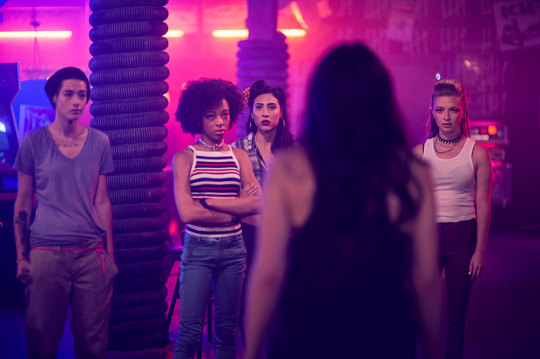
This is not the only flaw within the production practices for this film. Similar to criticisms regarding Pose and The Death and Life of Marsha P. Johnson, Elmore is a cis white man who took it upon himself to tell a queer story. By doing so, he took production resources and material benefits from its popularity away from the trans, lesbian, and POC communities who live the stories that he is telling (Tourmaline, 2017). Elmore explains that he read multiple theoretical texts and memoirs regarding gender while writing the script, and then had a close, gender non-conforming friend of his approve it before he, “felt more comfortable to show it to people in and around that conversation and community that I wasn’t close to” (Dunagan, 2019). While he did a fair bit of research into the community before creating the film, this isn’t the same as being a member of the community. Cavalcante explains this difference as a split between identifying with and identifying as a character, with identifying as a character always hitting closer to home and being more personal (2017, p. 14). Although Cavalcante makes this distinction in regards to audience reception, I believe it can be applied to production as well, and how Elmore wrote characters he could identify with, whereas a trans or POC writer could have written more personal characters that they identify as. Because Elmore is not trans or a POC, he needed to enforce homonormativity in his film in order to create characters that he identified with, as he has never lived as someone on the margins.
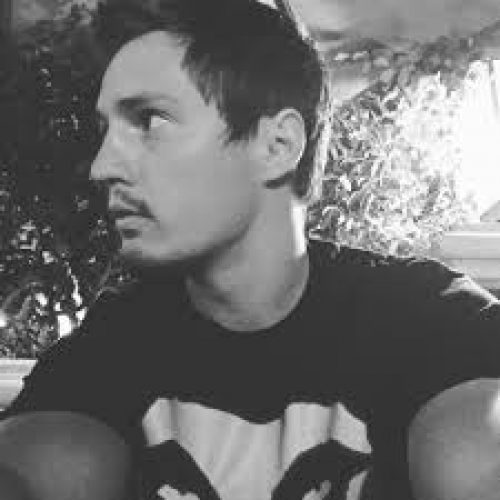
(Brad Michael Elmore, writer and producer of Bit)
Still, the production methods and content of the movie themselves could absolutely be described as queer. Benshoff & Griffin describe new queer cinema as films that have low-budgets, usually remain in the arthouse, and show the inadequacy of labels, instead focusing on the social discourses surrounding gender, race, and class (2004, pp. 11-12). Bit checks all of these boxes, even offering some helpful insights into social discourses. When Laurel, the transgender protagonist, is turned into a vampire, Duke tells her that their number one rule is to absolutely never turn a man. Laurel looks worried and asks, “What about me?” to which Duke responds, “Never even crossed my mind” (Elmore, 2019). Her immediate acceptance of Laurel’s identity expresses a consistent mood throughout the entire movie. Laurel’s transition and identity are never remarked in more explicit terms, and the sexuality and ethnicity of the other women are all treated with the same unspoken acceptance. The only identities that are ever mentioned are class and sex; Laurel asks one of the girls how they afford to live in L.A., and anyone who identifies as a man is immediately treated with contempt.
youtube
(watch video until 42:50)
While these approaches to intersectional identity may function well within the underground audience of new queer cinema, they could cause problems if Bit were to hit the mainstream. As Tongson explains, media representations help to produce our material realities; we rely on media to understand identities that we don’t know in the real world (2017, p. 158)). By ignoring the struggles of marginalized communities in the film, Bit raises more questions than it answers for viewers who are unfamiliar with these communities. Their confusion could cause these people on the margins to become cultural interpreters and explain their communities to those who don’t understand. Some see this as an opportunity to share their life experiences and cross cultural bridges; for others, it can become a burden of representation and they may lose a feeling of privacy (Cavalcante, 2017, p. 11). Bit could be seen as a welcome break from tragic representations for people within the trans community. Conversely, Elmore’s silence on these issues could also lead mainstream audiences to believing that marginalized communities do not face any struggles in modern America, and therefore lose some empathy.
This mediated understanding of reality could also be greatly detrimental to the feminist movement if it were to hit the mainstream. While I loved the explicitly feminist tone of the film, other audiences could find it off-putting and apply Bit’s ideology to all real-life feminists. The group of women in this film are quite outspoken around their distrust and distaste toward men. This could be applied to feminists, who are already called “man haters” in the real world as an attempt to invalidate their arguments. Elmore could be adding fuel to this fire by depicting feminists as exactly what the mainstream fears them to be.
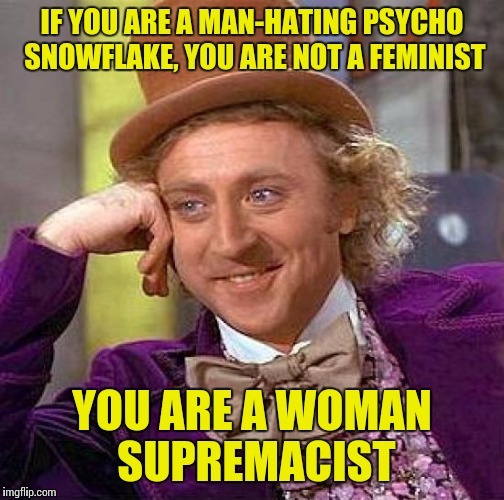
Simultaneously, this bold approach to intersectional feminism is exactly why I, and many other queer viewers, love this film. My own subject positionality influences my understanding of Bit, just as those of mainstream audiences would make them feel differently about the film. I am a college-educated, middle-class, white, bisexual woman. I am also an outspoken feminist and socialist. All of my converging identities influence my view on this film and the opinions I have on its themes. As a young person who spends a lot of time in feminist spaces online, I felt such a rush while watching this film and hearing them directly saying things like, “Men can’t handle power. They have it already, and look at what they have done with it” (Elmore, 2019). A lot of people online say things about hating men, and I know from my own personal experience that the argument is so nuanced that it is simply easier to say “kill all men” than it is to explain what feminism really stands for and how it is, in fact, not simply man-hating. I love that this film expects the viewer to have this same knowledge, and can therefore say things like this without needing to defend itself and explain all of the nuance behind such a statement.
My status as middle-class and a socialist also have a great impact on my subject positionality and interpretation of Bit. Coming from a middle-class family and city, everything in the movie seemed normal to me. I was able to identify with the characters’ struggles, as they didn’t have anything to do with money or family issues. However, I could see this posing an issue for people who are struggling financially or with their family dynamic. To make up for this, the film has a lot of discourse regarding the redistribution of power and resources. Downward redistribution is a key tenant of leftism, so this movie displays clear leftist ideologies from a socio-political perspective (Duggan, 2002, p.XVI). We can see this in lines like, “How would you like to hold the keys to the kingdom for a change?” when Duke is talking to Laurel about turning, and at the very end of the movie, when Laurel’s brother asks her what they should do next and she responds, “Maybe what everyone with power should do and never does: share it” (Elmore, 2019).
youtube
(watch video until 1:30:00)
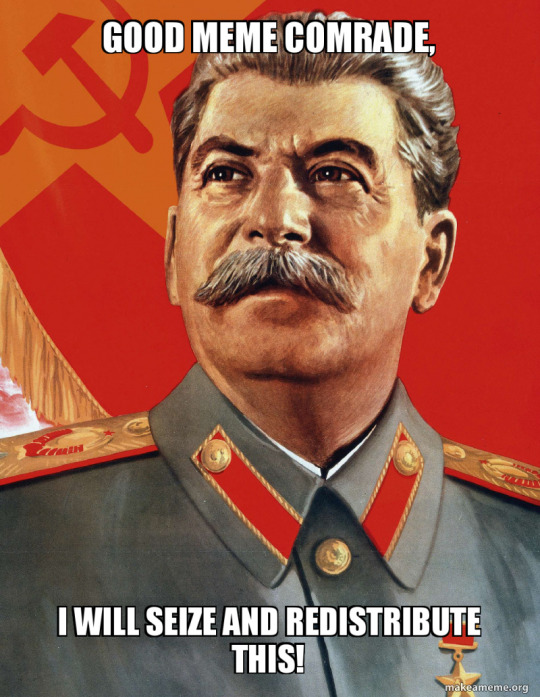
Finally, watching this film from the subject positionality of a woman greatly influenced my interpretation and reaction. At first, I was appalled by the group of girls and how nonchalantly they killed people, especially men. Laurel was written to have the same feelings of shock and disgust. So, when Duke said, “Our role is secondary. Our bodies are suspect, alien, other. We’re made to be monstrous, so let’s be monsters,” (Elmore, 2019) that was enough of an explanation for Laurel, and for myself, to become sympathetic to their cause. I have been personally affected by the feelings of otherness and being secondary that Duke lists, so this was a perfect line to change my opinion on their actions. However, if a man were to watch this film, especially if he were not to be a feminist, he might not be so sympathetic because he does not have the same experiences and understanding of what it is like to live in this world.
youtube
(watch until 41:12)
Bit is a film that crosses many boundaries, while still upholding some homonormativity for the sake of profit and consumption. It was written with the expectation of an audience that is knowledgeable of marginalized communities and social issues, making it thoroughly enjoyable to watch from a queer perspective. However, if the film were to break into the mainstream spotlight, its lack of nuance could cause harmful backlash toward trans communities, people of color, woman-loving women, and feminist movements.
References
Benshoff, H. M. & Griffin, S. (2004). Queer cinema: The film reader. Psychology Press.
Cavalcante, A. (2017). Breaking into transgender life: Transgender audiences’ experiences with ‘first of its kind’ visibility in popular media. Communication, Culture & Critique, 10(3), 538-555. https://doi.org/10.1111/cccr.12165
Duggan, L. (2002). Introduction. In The twilight of equality? Neoliberalism, cultural politics, and the attack on democracy (pp. X-XXII). Beacon Press.
Dunagan, R. (2019, August 2). Interview: A talk with Brad Michael Elmore, Director of OUTFEST’s ‘Bit’. Flipscreen. https://flipscreened.com/2019/08/02/interview-a-talk-with-brad-michael-elmore-director-of-outfests-bit/
Elmore, B. M. (Director). (2019). Bit [Film]. Vertical Entertainment.
Joyrich, L. (2013). Queer television studies: Currents, flows, and (main)streams. Cinema Journal, 53(2), 133-139. https://doi.org/10.1353/cj.2014.0015
Tongson, K. (2017). Queer. In L. Ouellette & J. Gray (Eds.), Keywords for media studies (pp. 157-160). NYU Press.
Tourmaline. (2017, October 11). Tourmaline on transgender storytelling, David France, and the Netflix Marsha P. Johnson Documentary. Teen Vogue. https://www.teenvogue.com/story/reina-gossett-marsha-p-johnson-op-ed
6 notes
·
View notes
Text
https://rwbyconversations.tumblr.com/post/626550438587678720/the-scarlet-letter-lets-talk-about-rwbys-male
Can’t even say I stan RT since I helped in developing your own break in RT’s abusive business practices.
So let’s start with a blunt statement: RWBY’s male LGBT representation has not been good. If the series’ handling of female LGBT rep is good (which… well there’s worse shows) and the general standard for how you write LGBT characters in a show like this, its handling of male rep has been… how not to. And Before the Dawn kinda solidified the idea in my head that the show’s handling of its male LGBT cast just isn’t good enough, either by the standards of when RWBY began in 2013, or today in 2020 when compatively massive steps have been taken over the past decade to show a more diverse list of characters… or at least a more diverse list of female characters.
So how do you make good male LGBT representation? If we’re talking about how something is done badly, you’d think some ground rules would be established. ... Yeah, he never does that.
It’s big romance is (unless the writers are very stupid) going to be between Blake and Yang, their first out character was Ilia, Coco got sent to the Book Dimension where she confirmed “I use my sunglasses to perv on women without their knowledge” which uh… yeah you can definitely tell RWBY is written by men… and Volume 6 had Saph and Terra being a good example of an LGBT couple without any real drama. In the last three years alone, the show has drastically increased its lesbian and bisexual characters, alongside even including its first out trans character in May Marigold (albeit only revealed on Twitter). In general, these depictions of sexuality have been pretty OK. Would have liked it if Ilia wasn’t immediately written out of the show after Volume 5 as it made her feel a bit more disposable than intended but whatever, subject for another day.
A. What examples do we have of Bumbleby being canon? One or two animation things and voice actors? Cool, when’s White Knight becoming canon.
B. I’ve heard Barbara say similar shit. Acting like that’s a male thing is fucking sexist.
C. I’m sorry but by every single standard of LGBT writing I’ve heard-wouldn’t they be considered tokens and flat caricatures? Since they’re so irrelevant and have so little character? They’re barely even characters INCLUDING their kid.
Sorry but considering how there’s no ground rules made for what is good LGBT rep- I can only go off what others have said. And so many, OVERWHLEMINGLY MANY, people have said Saphron and Terra aren’t good.
D. Okay the Illa thing is yet another example of why ground rules need to be set. Saphron and Terra BOTH are written out in Volume 6 so wouldn’t they get chewed out too? What makes Illa getting written out different or more disposable?
RWBY’s male rep though is a bit spottier. There’s the plant bois in Volume 5’s premiere, we nearly had Pilot Boi until some last-minute revisions, and… Scarlet.
Look about the same as the female LGBT audience to me. Why is this so bad?
“Why Scarlet’s a bad launchpad for male LGBT rep”
I don’t like Scarlet or how his sexuality has been handled. Scarlet’s homosexuality wasn’t revealed in the show, or by the writers, or even in anything that’s actually canon. He’s confirmed gay in his sole of dialogue in a non-canon fan anthology, where the manga’s Twitter team had to say that Miles suggested the idea and approved of it.
In short, Scarlet is Dumbledore’d, where his sexuality is revealed in out-of-show material and in a way that doesn’t make it supremely obvious (Miles himself never commented to confirm this so this news was limited in how far it could spread. I’m genuinely curious how many people still don’t know Scarlet’s gay), and Scarlet himself is a nothing character who was written out of the show after Volume 3 and only reappeared in Before The Dawn, half a decade after he vanished. Compared to Ilia, as this came out after Ilia’s entire arc in Volume 5, it’s not a great starting point for mlm rep. But things would have been forgiven if it had gotten better, if the show did have more male LGBT characters introduced, even just on the Saphron/Terra level of just being around for a few episodes before leaving. Then it would have been a misfire but then we could all say “Things got better.”
Why should I care?
See, part of the job of a critic is to make the problems understandable to the audience. I emphasized ground rules because it gives the reader a base level understanding of what constitutes as good in this case. Why should I think Scarlet is bad when Saphron and Terra are on the same level and you said they were at least acceptable?
It… didn’t. Which is why when Before the Dawn released in 2020, a full two years after Scarlet was first confirmed gay, while the franchise had more than doubled its wlw rep, Scarlet remained the one male character in the entire franchise who had a name and liked men. I remember vividly a fake leak for After The Fall which claimed Yatsuhashi would come out to Velvet and admit to having a crush on Fox. And I remember as well how many people were disappointed when it was said to be false, because it would have been nice for Yatsuhashi’s character, especially after the fleshing out he gets in the CFVY books. If Yatsu had come out as gay in the books I’d like his writing enough to say he’s a good case for rep, albeit with the caveat of “This is all in side material.” But in reality, the leak was fake and Coco was confirmed gay instead.
I remember the same leak. Yatsuhashi also disappeared at the same time and even if he was fleshed out-he’s still irrelevant to the show so wouldn’t he be bad? And if it’s about having fleshed out characters, why did Illa whose a fully realized character get shaded while effective background characters praised?
Unfortunately, Before the Dawn proceeded to ruin Scarlet and made me at times feel genuinely uncomfortable as a queer man! Let’s talk about that.
And people said the same about Saphron and Terra and people get backlash for praising them over other lesbian characters.
I hate Before the Dawn. It’s… bad. I read it while on a vacation and the only solace I had about the entire thing was that I’d bought an M&M chocolate bar. The bar was finished before the book. That bummed me out. It’s not a very well written book, the prose is very Early 2010s YA Writer, none of the characters are memorable and there’s various Fun Incidents like “NGDO using children as bait for Grimm,” and “Neptune’s hydrophpobia being used as a threat to torture him and the scene is played for comedy.”
A. NDGO is repeatedly shown to be massive assholes in the book.
And B. I can’t really find anything wrong there. In one of my favorite shows, Justice League Unlimited, criminals get threatened with actual torture and even death and it’s treated as a joke. Yeah the context is different in that the victim are criminals but both the villains and Neptune get over it so quickly I see no real problem here. Especially since Jaune’s own low self worth was a joke up to Volume 5.
Theo was cool. I can’t wait to see him as written by good writers, he should be a highlight of the Vacuo arc.
Don’t go blaming E.C. Myers for this- Miles and Kerry helped. You’d have to call them shit writers too.
I had two hopes for Before the Dawn- “Don’t be bad,” and “Let Scarlet and Sage be well written.” I’d liked how After The Fall had handled some of its characters (barring, y'know, Coco perving on women), especially Fox and Yatsu who were surprising in how much I liked them. I was looking forward to seeing Myers give Sage and Scarlet similar treatment- two relatively nothing characters meant he’d have a blank slate to write them however he wanted, he could give them unique personalties and if nothing else it could be cool to see their Semblances.
You know how frustrating it is to see people blame Miles and Kerry for shit that Monty had a hand in and may have even been responsible for?
Yeah well we finally found the flipped version-
Miles and Kerry worked with Myers on the book. Just as Monty is just as much at fault as Miles and Kerry, they’re just as much at fault as Myers.
And then I read the book. (Sage fans I am so sorry for you, you got baited harder than Johnlock fans)
I thought we were talking about male LGBT rep.
Scarlet’s a giant dickhead in the book. It’s his sole character trait and his inner monologues go on, and on, and on about how much he hates Sun, how he revels in mocking him. Most of his dialogue is sarcastic put-downs about Sun and how lame he is, and Sun is never properly allowed to defend himself or point out how going with Blake meant he was able to help save Haven Academy.
You mean like how character criticized Yang for being so reckless even though she was trying to save Blake?
It shouldn’t matter what the intent or results are- Sun and Yang still did bad things and affected the people around them. They should be criticized, especially Sun here since A. He’s still doing it in the book, B. He hasn’t had any real flaws in the show which means his dynamics and interaction are limited and C. This addresses what people bitched at him about in Volumes 4 and 5 thus robbing them of the excuse to chew him out anymore.
(hey remember when Sun in Volume 6 expressly says to Blake “I was a bad leader for ditching Neptune and the others, and I need to work on that” only for Before the Dawn to have him staunchly refuse to accept that he let the team down? I don’t think Myers did but I do)
Remember how characters in RWBY don’t always learn their lesson, especially when it’s related to mental issues like...say....losing their parents and trying to run from their problems?
Also remember how MILES AND KERRY ALSO HELPED WRITE THAT BOOK?
Scarlet being a ratty bitch would be one thing if, again, the franchise had done more rep. He’d still be a badly written character, but it wouldn’t sting as much. But because Scarlet is still the only expressly confirmed male LGBT character in canon (the book teases that Nolan is gay but there’s never confirmation either way beyond him smiling at Scarlet), it means that he has to represent that entire ideal. So when the one gay man in Remnant is being an asshole and a snide loser, that means that by extension, this is how the franchise sees gay men. And that fucking sucks! I wanted to come out of Before The Dawn singing its praises, I wanted to like the book, but it was a massive letdown, especially coming off of the other big 2020 RWBY controversy involving gay characters.
Fun fact: LGBT people can be assholes.
In fact, Scarlet would be the ONLY LGBT character to be snide in the show. Kind of makes him unique in that regard. ...If he was an asshole in canon. When in canon, he’s portrayed as hurt and bitter over Sun’s repeated irresponsibility and doing what anyone would do in his situation.
So honestly, he’s pretty fucking human which I would praised BEYOND being LGBT.
Yeah. We’re doing this.
Remember, you choose to do all this.
Clover and Fair Game: Technically not queerbaiting. BUT:
But nothing. Once again, without any ground rules for what you constitute as ‘queerbaiting’- I only have myself to rely on. And just about every serious definition says Queerbaiting is baiting LGBT rep or pairings to get people to watch the show.
Issue? Not only was Fair Game not used to promote the show, there are other LGBT characters in RWBY. You can’t be queerbaited anymore than a straight person can be ‘straightbaited’ (We’ll be getting into SO MUCH MORE than this later...).
Let’s pre-empt this: Clover wasn’t queerbaiting, and Fair Game, while cool and I dig it, kudos to them for becoming one of the top 5 RWBY pairings on AO3 in one year that’s fucking impressive (I say with mild malice as an IronQrow main), never had a chance. The writing never seriously boosted it barring one interaction which was flirty (them talking in the lobby of the Schnee Manor), and everything else was out of show boosting through the social media teams and CRWBY hyping it themselves by saying they liked it. If you wanna blame people, blame the animators who went off-script with stuff like Kim Newman adding the wink as a deliberate nod to the Volume 4 waitress, or the social media team deliberately using the same policies for Fair Game as they do for Renora and Bumblebee.
So nothing I should give a shit about since marketing teams often work detached from the actual product and are notoriously CUTTHROAT.
It wasn’t Eddy’s fault that things escalated, and he himself has said that in retrospect, he should have warned people that this never had a shot.
But I can’t blame the Fair Game fanbase. Because Fair Game took off like wildfire. It came right as the fanbase began seriously asking for more male rep, Qrow’s pretty hot, and the Clover wink came right after the Great IronQrow Reawakening of November 9th, 2019. The rocket was primed, and they rode it to the moon. Finally, to these people, after seven years RWBY seemed to be doing something with mlm rep in show. People started getting into RWBY just for Clover and Qrow’s interactions. And if heroes were boring, Watts and Tyrian also had a fantastic dynamic that made Nuts and Volts one of the more popular villain ships overnight. Things seemed to be turning around! RWBY was remembering that gay men existed! You could hear the choir sing!
... You JUST said that show didn’t bolster the ship aside from one interaction (one that pales to the shit I use to say in private to fuck with people). It was obviously NOT meant to be a serious component of the show. If people got into a show for something it was never meant to stick to- it’s their own fault for when that part falls away.
… And for those people, that meant that episode 12 hit like Truck-Kun.
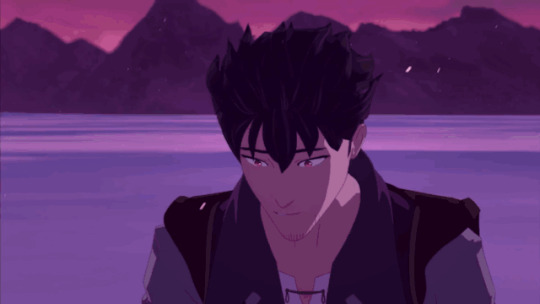
People got pissed. People were horrified. And it didn’t help that some members of CRWBY had said in the build-up that episode 12 would have some shots that made them nauseous (probably the Tyrian thumb thing) Out of context, it looked to these fans like CRWBY were basically laughing at their suffering, like they were saying “Lol, you thought you had a chance, get fucked, I hope your vomit burns on the way up.”
Yeah, Fair Game was never gonna be canon, and I think some people ran too far with it. But in the wider context of how desperate RWBY’s mlm community had gotten for basic crumbs of content? I can see why they’d run with what they had. The writers aren’t at fault for what happened, but CRWBY didn’t help matters. And that desperate mix of what felt like official backing from the crew, jokes about how cute the ship was, and the hope that finally the show would have onscreen rep? I can see why people ran with it.
Ah huh ah huh ah huh-
Now do that for the first three Volumes of the show with a bigger fan favorite, more build up and kill one half of it off at the end of the show’s big dark turn while the creators are even MORE unsympathetic.
Sorry but when compared to Arkos, this looks fucking minscule. And you invoked the Arkos comparison due to the numerous parallels. And just like with the Arkos fans, I’ll disregard this without a second thought.
‘But Mlm are STARVED for content-’
Then go somewhere else. I’ve been saying this to your Wlw AND Straight counterparts for years. You are not entitled to have ‘a meal’. The show didn’t advertise in universe around rep- That is not the point. This is like saying you hate nachoes because it dares to have chips instead of more toppings.
So why is the show more lackluster in depicting mlm characters?
I don’t think you ever answered that the question ‘is the show’s mlm lackluster?’ because you spent a third of this post talking about something you basically admit doesn’t count.
Money. Let’s be honest, most RWBY fans don’t care if the show doesn’t have good male rep. I’m willing to bet some of you reading this won’t care and just dismiss it as not being that big a problem.
I dismiss all the romance related shit as not being that big of a problem, so what?
I don’t think the writers care if the show doesn’t have good mlm rep because they’re not poaching that market. They’re after what they see as a bigger, more lucrative market, which in this case is female LGBT rep. That gets people buying games, watching shows, raising awareness and boosting awareness of your property, which means you make more money. In short: Two women kissing hits more markets and generates more attention than two men.
I’d believe that if not for the fact that there is barely any lesbian merch for RWBY, which would be the key way to cash in on that market and squeeze them for as much money as possible. In fact, there’s barely ANY shipping merch from Rooster Teeth. Rather unusual if they’re trying to cash in on a market.
‘Well what’s YOUR explanation?’
Easy: Misandry and moving goalposts.
Guys notoriously get shat on in the fandom more than women. Jaune is STILL being called a spotlight stealing MAry Sue and numerous people are siding against Ironwood because he’s a man. So making good male LGBT rep would just be inviting more pipe bombs in the mail.
And a large amount of people like to claim RWBY has yet to give GOOD female LGBT rep, constantly raising the bar to get what they want. And considering they make up the original hatedom in the show- they naturally hold more power.
Tl;Dr- You fucked yourselves out of good male rep by having male characters having any focus whatsoever be a death sentence.
Am I saying that Miles, Monty and Kerry deliberately sat down seven years ago and said “We’re not doing gay men because it won’t generate enough ad revenue and traffic to be worth the loss in revenue from homophobes?” No, that’s silly. But I’m saying that it’s less important for them, and it shows in the things that are small and add up. Things like Miles not verifying Scarlet’s sexuality or retweeting the manga account’s confirmation to spread the message (compared to how he enthusiastically confirmed Ilia being a lesbian himself during the Reddit AMA). It shows in how Pilot Boi would have been the first mlm character only to die in his second full episode until M&K were told about the Bury Your Gays trope. It shows in how Shannon believes that Ozma is “megaqueer” and Miles jokingly laughs it off instead of confirming it, leaving it to just be Shannon’s headcanon. It shows in how actor shipping is compared between the mlm and wlw ships, where Arryn and Barbara’s frequent pushes for Bumblebee are seen as “official confirmation that it’s endgame” while Michael and Kerry saying they enjoy Seamonkeys is treated as “well it would be cute if they did it, but they’re never going to.”
The whole point of AMA is answer questions, one of which was ‘is Illa a lesbian’ among SEVERAL others.
Yeah and Illa gets called a psycho lesbian.
Yeah and no other voice actor headcanon has been accepted. In fact, Kara pushes for White Knight and the writers don’t even so much as acknowledge that unlike Shannon. Also I dunno what ‘megaqueer’ means but his only on screen relationship was straight so that’s probably why it wasn’t confirmed.
Not the creators, don’t care.
I’m not gonna say anything like “CRWBY are gonna have Qrow end up with a woman like Robyn out of spite against the bad apples of the Fair Game crowd.” I’m not gonna say that I don’t think CRWBY cares about male representation in the series. It is, however, definitely a low priority for them, and because that leads to gaffes like Scarlet’s writing in Before The Dawn being offensive in his depiction, it only makes the contrast between the sexes all the more painfully apparent.
Again, the female side ain’t much better. Fuck, the straight side isn’t much better. This was never a focus of the show.
I’m kinda tired of waiting for Rooster Teeth to show that they do care about mlm. I’m kinda tired of RWBY’s male rep being written like it came from a 1993 time capsule where I have to enhance the screen to see a guy holding a sign of Sun’s abs or be content with the only onscreen rep still being the plant bois in Volume 5. I’m tired of how often the crew dances around answering basic questions about sexuality (and age, and birthdays, and heights, and so on) by treating it as a spoiler question, as if just wanting to know what way people swing would ever be a spoiler. I’m just… tired of all this. When the best mlm rep in Rooster Teeth’s history remains the two dads in Camp Camp who show up in a few episodes, that should say something really bad about your company and your biases (To say nothing of the recent Red vs Blue seasons and their blatant queerbaiting for Grif and Simmons and the whole can of worms that is Donut).
And their best rep in wlw according to some people is a psycho lesbian.
This is all just personal opinion that is next to useless without the basis needed for clear understanding. I don’t know what you would consider good male LGBT rep aside from a squeaky clean good guy...and many would decry that as condescending and unrealistic.
What can they do except ignore EVERYONE and just do whatever they feel like?
P.S. Someone’s representation is NOT their view on LGBT people. Especially since, as I have said, the reception of said rep can be outright contradictory.
I’d like to not feel like I’m borderline unwelcome because I’d like to see two men in this show kiss, and that the sole thing that represents people like me in this show is some British twat who complains about sand.
Oh fuck off. I’m also apart of a minority group (autists) and yet you don’t see me winging about how unwelcome I feel because there’s no autistic characters. I relate to characters like Ruby not because they have shallow autistic traits but because I constantly struggle with the same ideological dilemma Ruby does: the struggle to keep doing good in an uncaring, cruel world. THAT is what you should find relatable and welcome. Not something like sexuality.
I’d just like to feel like my sexuality isn’t a joke to Rooster Teeth (or at the very least, be like Donut and have it be a funny one). But at this point after the last few years? I feel like a very uncomfortable punchline to them. And it just sucks.
Cool-Welcome to club. You know, since EVERY sexuality has been used a punchline by Rooster Teeth.
Your sexuality should be the LAST thing that you use to find being welcome, especially with a god damn company. And you have no one to blame for your feelings but yourself here.
Your post is damn near useless and I don’t even know how honest that RT stuff is considering Miles and Kerry get away while E.C. Myers gets blamed for stuff you don’t like.
8 notes
·
View notes
Text
Camille Has Many KDrama Thoughts
As some of you have possibly noticed, I have recently fallen into a KDrama hole and I can’t get up, and I have just finished my 10th drama, which seems like less of an accomplishment than I thought now that I say it out loud, but anyway,
As a checkpoint/thinly veiled plug of some shows I love very much, here is a very long post with some of my thoughts on all the KDramas I’ve seen so far, as well as what’s next on my list, in case you too were interested in joining me in nonexistent fandom hell!
So firstly, all of the dramas I have watched to completion, in the order of how much I like them. First, my top five:
1. Sungkyunkwan Scandal (2010). My #1 favorite drama to date. I’ve probably watched it in full 4-5 times, and it’s still an absolute treat every time. Is it the best drama I’ve ever seen? Probably not. But it’s so fun and charming that it’s just gotta be at the top of my list.
The best way I can describe this drama is Ouran High School Host Club, except in Joseon era Korea, and instead of flirting with girls the main characters learn about Confucianism and solve mysteries and play sports (twice) and end up accidentally involved in a complicated political scandal. Also, that one text post about how Shang from Mulan is bi because he falls for Mulan while he thinks she’s a man...This drama has that, except actually canon. And while I won’t pretend this is show is a shining beacon of representation, there are multiple main characters who are explicitly not heterosexual and several others with very plausible queer readings, which earns it a very special place in my heart.
As for the actual premise of the show, it’s basically about a wonderfully determined and kind and clever but lower-class girl whose writing skills catch the eye of the most stubbornly strait-laced but idealistic aspiring politician-type on the planet. She ends up getting a one-way ticket to the most prestigious school in the country, except she has to pretend to be a man the entire time because women aren’t allowed to be educated at this time.
It’s a bit of a silly, cheesy show, and here are many wacky shenanigans, but the main cast is full of incredibly highly endearing and multifaceted characters, there is a lot of sexual confusion, the slowburn roommate romance has an incredible payoff, and it’s also full of deeply moving social commentary about class, privilege, and gender roles. This drama is a blast and I could go on and on about what I love about it, I absolutely adore it to pieces.
2. Six Flying Dragons (2015-2016). I debated between this and Tree With Deep Roots (next on my list, to which SFD is a prequel) as my #2 but I do think I want to place SFD higher just because it's the drama that I keep thinking about even after finishing it. of course, it has the dual advantages of 1) being released chronologically later (and having better production value, etc., because of this) and 2) being twice as long, but there’s just so much stuff to unpack with SFD that it makes me want to keep coming back to it.
The show is about the founding of the Joseon dynasty, and six individuals (half of whom are based on real historical figures and half fictional) whose lives are closely tied to the fall of the old regime and the revolution that brought in the new. It has an intricate, intensely political plotline based on the actual events that happened during this time, and though this may sound kind of boring if you’re like me and not super into history (admittedly, the pacing in the beginning is a tiny bit slow), it quickly picks up and becomes this dense web of character relations and political maneuvering. Though none of the major events should come as a surprise if you’ve seen TWDR or if you happen to already know the history it was based on, the show adds such a depth of humanity and emotion to every event and character that nothing ever feels boring or predictable. As a matter of fact, there are several events that were alluded to in TWDR that, when they actually happened in SFD, left me breathless--because although I 100% knew these were foregone conclusions that were coming up at some point, I still had a visceral moment of, “oh no, so that’s how that came to happen.”
But though I really enjoyed following the story of SFD and learning about the history behind it, the highlight of the show for me is definitely the great character arcs. I loved TWDR’s characters, too (especially Yi Do, So Yi, and obviously Moo Hyul), but with double the episode count SFD just has so much time for rich, dynamic character development, and I absolutely loved seeing how these characters grew and changed over time when their ideologies and fates collided in this turbulent and violent age: How young and ambitious Yi Bang Won eventually spiraled into a ruthless tyrant, how the naive and kind-hearted Moo Hyul struggled to retain his humanity in a bloody revolution that challenged his values and loyalties to the core, how the fiercely determined and idealistic Boon Yi grew into a pragmatic and capable leader who comes to realize what politics and power mean for her and her loved ones.
SFD was also everything I wanted as a prequel to TWDR--I loved seeing the contrasts between some of the TWDR characters and their younger selves in the SFD timeline: The hardened and ruthless Bang Won as a passionate and righteous adolescent, the cynical and resigned Bang Ji as a cowardly boy who grows into a traumatized and bitter young man, and my personal favorite character, the comically serious bodyguard Moo Hyul as the very model of the dopey, lovable himbo archetype. And though the ending was controversial among fans (particularly those who watched SFD first), I loved how it closed all the loops and tied it back to the events of TWDR, both providing that transition I wanted but also recontextualizing and adding new meaning to the original work. I think it's still a very good drama on its own, but this hand-off is what really sealed the deal for me personally, because it was not only super emotionally satisfying to watch how the stories connected, but it elevated TWDR to something even greater (suggesting that Yi Do and the events of TWDR was the culmination of everything the six dragons fought so long and hard for), which is exactly what I expect from a good prequel.
I’ve already talked so much about this drama but I also do need to mention that the soundtrack to SFD is A+, and the sword fights are sick as hell. There is also some romance, though it’s not really a focus--and all the pairings that do exist are extremely tragic, which is exactly up my alley. Overall, this is a hell of a historical drama, coming of age, villain origin story, and martial arts film in one, and I highly recommend it.
3. Tree With Deep Roots (2011). The sequel to SFD, though it aired first chronologically. Although this show isn’t one of those shows that I could rewatch once a year like SKKS or keep ruminating on like SFD, TWDR (much like Les Mis, or Fata Morgana) is thematically the kind of story that just makes my heart sing.
The story centers around the creation of Hangul, the Korean alphabet, by Yi Do (a.k.a., King Sejong the Great, who is the son and successor of Yi Bang Won, the main character of SFD) as well as two fictional childhood friends whose backstories and ambitions become central to the story of how and why this alphabet came to exist. Not only is the actual process of creating this alphabet absolutely fascinating from a linguistic and scientific POV, but the show dramatizes Yi Do’s motivations in a way that’s so incredibly touching and human--portraying the king as a soft-hearted and extremely charismatic yet fundamentally flawed and conflicted figure who tries so desperately to do right by his people.
The show explores both a number of personal themes like redemption, atonement, and vengeance, as well as broader societal themes such as the ethics of authority, the democratization of knowledge, and the power of language and literacy. Though the show never forgets to remind the audience of the bitter reality of actual history, it’s still a deeply idealistic show whose musings on social change and how to use privilege and power to make the world better are both elegant and poignant.
Romance definitely takes a backseat in TWDR, even more so than SFD, though this isn’t something I personally mind. There are, however, a lot of interesting politics surrounding the promulgation of the alphabet, including a string of high-profile assassinations--if SFD is historical/political-thriller-meets-action-film, then TWDR is historical/political-thriller-meets-murder-mystery, and it’s an incredibly tightly written and satisfying story whose pieces fall into place perfectly. Though not the sprawling epic that SFD is, TWDR is an emotional journey and an extremely well-written story with a TON of goodies if you’re as excited about linguistics as I am.
4. White Christmas (2011). My first non-sageuk on this list! White Christmas is, in a lot of ways, an odd drama. It’s an 8-episode special, and featured largely (at the time) new talent. it’s also neither a historical work nor romance-focused, but instead a short but intense psychological thriller/murder mystery.
The premise is this: Seven students at a super elite boarding school tucked away in the mountains receive mysterious black letters that compel them to remain on campus during the one vacation of the year. The letters describe various “sins” that the author accuses the students of committing, as well as the threat of a “curse” as well as an impending death. The students quickly find that they’re stranded alone at the school with a murderer in their midst, as they are forced to confront their shared histories and individual traumas to figure out 1) why they’ve been sent the letters, and 2) how to make it out alive. At the center of the survival game the characters find themselves in is a recurring question: “Are monsters born, or can they be made?”
If you’ve been following me for a while, it’s easy to see why I was drawn to this drama. In terms of setup and tone, it’s Zero Escape. In theme, it’s Naoki Urasawa’s Monster. It’s Lord of the Flies meets Dead Poets Society. or as one of my mutuals swyrs@ put it, Breakfast Club meets Agatha Christie. The story is flawlessly paced with not a scene wasted. There’s so much good foreshadowing and use of symbolic imagery, and though I’ve watched it at least 3-4 times, I always find interesting new details to analyze. The plot twists (though not so meta-breaking as ZE) are absolutely nuts, and aside from the somewhat questionable ending, the story is just really masterfully written.
Above all, though, WC is excellent for its character studies. Though I typically tend to stay away from shows that center around teenagers because I don’t find their struggles and experiences particularly relatable, WC does such an excellent job of picking apart every character psychologically, showing their traumas, their desires, their fears, and their insecurities. We see these kids at their most violent and cruel, but also their most vulnerable and honest. Their stories and motivations are so profoundly human that I found even the worst and most despicable characters painfully sympathetic at times, as cowardly and hypocritical and unhinged as they became.
Like I said, it’s only 8 episodes long with probably the best rewatch value on this list. My only complaints about it are its ending, as well as its relative lack of female characters, but otherwise I would absolutely recommend.
5. Signal (2016). Okay, this might be the recency bias talking because I just finished this series but I'm sure but I'm still reeling at the mind-screw of an ending and I feel like it deserves a place on this spot just for that.
Signal is a crime thriller based on a number of real-life incidents that happened in Korea in the last 30 or so years. In short, a young profiler from the year 2015, who has a grudge against the police after witnessing their incompetence and corruption twice as a child, happens to find a mysterious walkie-talkie that seems to be able to send and receive messages from the past. on the other end is an older detective from 2000 who tells him that he’s about to start receiving messages from his younger self, back in 1989. Through the seemingly sporadic radio communications, the two men work together to solve a series of cold cases, which begin to change the past and alter the timeline.
As they solve these cases, expose corruption within the police department, and correct past injustices, the two men (along with a third, female detective who has connections to both of them) also begin to unravel the mysteries of their pasts, as well as why and how they came to share this connection.
Like WC, the story and pacing of this drama were flawless, reminding me of an extended movie rather than a TV series. I was on the edge of my seat the entire time, and the 16-episode run went by in no time at all. I always love timeline shenanigans and explorations of causality and fate and the consequences of changing the past, and this show has oodles of that peppered with the heartbreakingly tragic human connections and stories that the main characters share. The main pairing has great chemistry and gave me exactly the pain I crave from a doomed timeline romance, and the cinematography and soundtrack were also beautiful, which also contributed to the polished, cinema-like feel.
My only complaint is that I wish that the ending felt more like an ending, such that the drama could stand on its own. I do realize this is because there’s a second season coming, but right now the show feels somewhat incomplete, ending on a huge, ambiguous cliffhanger/sequel hook and with several loose ends. I obviously can’t give a final verdict until the entire thing airs (and I typically don’t like multi-season shows, so I will wait for the next season to come out both reluctantly and begrudgingly), but even where the show leaves off I still did enjoy it immensely.
...And now, some brief thoughts on the other 5 shows I’ve watched, because I ran out of steam and have less to say about these:
6. Healer (2014-2015). It’s been a few years since I’ve seen this show, but I remember being really impressed by this drama at the time, especially the storyline. Unfortunately though I don’t remember too much about the drama itself, which is a shame. It’s a mystery/thriller, I think, and there is hacking and crimes involved? The main character is a very cute and sweet tabloid writer and she falls in love with a mysterious and cool action boy who helps her uncover the truth behind a tragic incident that relates to her past, or something. Judging from my liveblog it seems like this was an extremely emotional journey, and I enjoyed the main couple (who are both very attractive) a lot, and it was just overall a cathartic and feel-good experience. I feel like I should rewatch this drama at some point?
7. Rooftop Prince (2012). It’s also been forever since I watched this show but I remember thinking it was hilarious and delightful and I definitely cried a lot though I do not remember why (probably something something time travel, something something reincarnation/fated lovers??). I do remember that the premise is that a Joseon-era prince and several of his servants accidentally time travel into modern-day Seoul and end up meeting the main character who is the future reincarnation of his love (?) and he is hilariously anachronistic and also insufferably pretentious, which the MC absolutely does not cut him any slack for, and they have an extremely good dynamic.
8. Coffee Prince (2007). I watched this around the same time as Rooftop Prince and I remember really enjoying it! it’s basically just SKKS, but the modern cafe AU, and I mean that in the best way possible? It definitely shares a lot of the same tropes--crossdressing/tomboy female lead, sexually questioning male lead who falls in love with her despite being “straight,” very good chemistry and also extremely charming secondary characters.
9. Shut Up Flower Boy Band (2012). This show...Was just OK. I enjoyed it at the time, but I can’t say I found it particularly memorable. As I said, I don’t typically find stories about high school students particularly relatable, and the battle of the bands-type plot was interesting enough at the time but didn’t really leave a lasting impression. As expected, the music was pretty good. I kind of watched this mostly to hear Sung Joon sing tbh?
10. Rebel: Thief Who Stole the People (2017). I wanted to like this show. I really did. I wouldn’t say it was bad, but the beginning was painfully slow, and I only really enjoyed the last 10 episodes or so, when the vive la révolution arc finally started kicking off. The pacing was challenging--the pre-timeskip dragged on about twice as long as it needed to, and I just wasn’t really interested in the Amogae/Yiquari storyline very much. I also really, really disliked all the romances in the show, especially the main pairing, since I didn’t particularly love either the male or the female leads until pretty late in the show. Overall I think I would have enjoyed the show more if the first 2/3 of it was about half as long, and it either developed the romance better or cut it out altogether.
What I’m thinking of watching next:
1. Chuno (2010). Mostly because the soundtrack to this show is so goddamn good, but also because I’m craving more historical dramas with good sword fights after SFD. I was kind of hoping Rebel would fill that need but I was a little disappointed tbh?
2. Warrior Baek Dong Soo (2011). Same reasons as above, honestly. also has a very good soundtrack, and Ji Chang Wook, who is a known nice face-haver, doing many very cool sword fights.
3. Mr. Sunshine (2018). Late Joseon era is something I’ve never really seen before in media so I’m pretty intrigued? Also Byun Yo Han was one of my favorites from SFD and I definitely want to see him in more things.
4. Rookie Historian Goo Hae Ryung (2019). A coworker recommended this to me and the trailer looks delightful. first of all it’s a sageuk with the gorgeous and talented Shin Se Kyoung in it playing a smart and plucky female lead, which have historically been extremely good to me, but also it gives me massive SKKS vibes, so how could I not.
5. My Country: The New Age (2019). This caught my attention because it’s based on the same historical events as SFD, so it features some of the same characters. I am very very interested in Jang Hyuk’s take on Yi Bang Won, even if he is less of a main character here compared to SFD, and he’s already an adult so he’ll already be well on his way to bastardhood. I also hear it’s very heartbreaking, which is instant eyes emoji for me?
6. Chicago Typewriter (2017). It’s about freedom fighters from the colonization era, which I’m very intrigued by after The Handmaiden and Pachinko, plus a reincarnation romance. I am very predictable in my choice of tropes. Also, Yoo Ah In is in it.
7. Arthdal Chronicles (2019-). Ok, it’s a gorgeous-looking historical fantasy set in Korea written by the same writers as TWDR and SFD, plus it has not just one but TWO Song Joong Ki characters, one of which is a pure, doe-eyed soft boy and the other an evil long-haired fae prince looking asshole who I hear is a complete and utter Unhinged Bastard Supreme. Nothing has ever been more Camille Bait than this, but unfortunately this show hasn’t finished airing, which does pain me deeply. speaking of,
8. Kingdom (2019-). It’s a fantasy sageuk with zombies, is about the extent I know about this show. The fact that it also hasn’t finished airing turns me off a bit but it looks absolutely gorgeous and I also just found out it was written by the same writer as Signal, so,,,,,,,,,
9. Gunman in Joseon (2014). I honestly don’t expect too much from this drama but I just enjoy its premise a lot? From what I understand it’s just Percy from Critical Role, but make it Joseon era.......Like, they just straight up took a Shadow the Hedgehog, “let’s make a sageuk, but guns,” approach, and I kind of unironically love that. Also the soundtrack kicks ass, which like...you can really see where my priorities lie here, huh,
10. Misaeng (2014). I don’t remember at this point why this is on my list but I found it in the Keep note I have of all the media I want to watch?? I have no idea what this show is about, except that it takes place in an office. Apparently Byun Yo Han is also in this one? I’m sorry this is the only non-sageuk or sageuk-adjacent show in this list, I know what I’m about, and it’s fancy old-timey costumes and cool braids.
#/#//#///#////#/////#cam thoughts#KDrama#this is the most self-indulgent thing i've written in a while but it felt good to shout my many thoughts into this void of a blog#also i typed most of this out a few days ago since which i already started watching misaeng#so far it is very good but also the exact opposite of what i was expecting..whatever that is??#long post /#Television
9 notes
·
View notes
Text
The continuing saga of narrative betrayal...
Back when SPN S13 aired I compared it a lot to Star Wars: TLJ. So I was very interested to see specifically how hand holding and touch would correspond to the final Star Wars movie. And OH BOY is the new movie a lot like SPN S15! There’s only one problem. The final Star Wars movie made a HUGE narrative betrayal. I’m on mobile so I can’t put a read more here but STAR WARS: THE RISE OF SKYWALKER SPOILERS BENEATH THIS PARAGRAPH!!
Touch as healing was a very important part of SW:TROS. Touch is about forging connections and mending that which has been broken. Touching, taking someone’s hand, is choosing them and choosing to care for them. We see it when Finn takes Rey’s hand in chapter 7. We see it when Rey doesn’t take Kylo Ren’s hand in chapter 8. And we see it when Rey puts her hand over Ben’s when he heals her near the end of chapter 9. At the heart of this entire series is how students become teachers. The past becomes the present then the present becomes the future. So onto narrative betrayal.
Using the Force to heal was visually introduced this week in The Mandalorian. And we now know why the episode was released early, because this ability would play a key narrative role in the final movie. Rey showcases this ability early in the film. She is rewarded when she does. Then she showcases it again after fighting Kylo Ren. She stabs him fatally then decides to save him. Two things are established: 1.) Healing is good and positive, and 2.) healing does not cost the healer their life. This is important. In typical student becomes the master format, structurally Kylo Ren (as Ben Solo/Skywalker) must then use it to save Rey. In TLJ they each saw a different future for the other. This vision of the future is experienced through the touching of hands. When Rey and Ben reach for each other a profound connection is made.
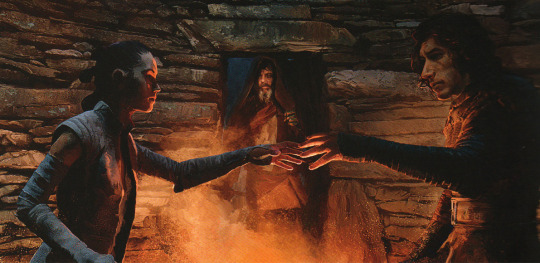
In TLJ Snoke says he forced their connection, but in TROS we see them maintain it. It’s much of the focus of the final two movies. They find each other with it. This living Force connection is said to have not been seen in a very long time. Rey teaches Kylo everything he needs to save her and then he does. And here is where our narrative betrayal comes and fortunately there’s enough of the ghost narrative here for me to make a solid enough guess why.

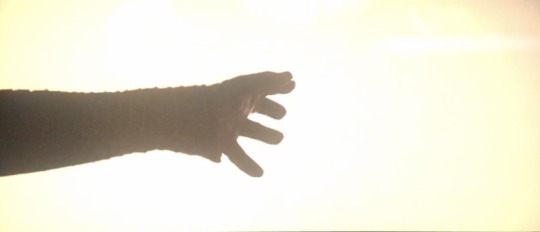
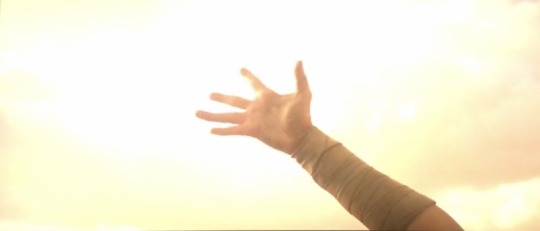
I believe when Carrie Fisher passed away unexpectedly that the final movie was forced to rewrite several key structural things. And one of those things is why Ben Solo had to instead die. In Dark Youth/Light Youth tales, the Dark Youth is usually saved by learning something explictly from the Light Youth. The LY is positioned to teach and the DY is positioned to redeem themselves by learning the lesson. This is sadly not what Star Wars executed. Ben touches Rey, heals her, then he kisses her and dies. It’s not *quite* as bad as what VLD did (at least Ben gets a heroic moment and we see him learn) with Lotor and Allura, but it’s the exact same relative betrayal. Ben was supposed to revive Rey in sacrifice, (maybe not kiss Rey, it doesn’t matter there one way or another; saving/redeeming =/= romance), and die temporarily but then get resurrected by all the dead Jedi. Instead we only hear the dead Jedi in one sequence when Rey fights Palpatine.
Since Leia doesn’t disappear until Ben disappears, this structurally links the change in narrative and gives it context. I think the kiss probably wasn’t in there originally but was added after the edits were made. Everything between Finn and Rey also feels edited as a result. The red flag for this is when Finn tells Rey he has something to tell her before they (almost) die in the quick sinking pit. He doesn’t get to tell her in time tho. Then! They survive. Rey prompts Finn to tell her what he was about to say but he says he can’t in front of Poe. This is never bookended. Rose is also sidelined without a real reason why. If originally they planned to continue the Rey/Finn romance on Finn’s part then this would make sense. In TLJ Rose’s structural purpose was to make Finn fight for more than just Rey. He never stops prioritizing her tho. The lack of bookend to Finn’s silenced confessional to Rey in TROS is a dead giveaway something was dropped/altered there tho. I can only guess this fragment of the final film’s ghost narrative remained in due to the fact that filming was likely already complete for this scenes and that suitable redubbing could not be made out of the plot situation they were currently in.
I just finished watching TLJ and we see Rey’s reaction to Finn caring for Rose’s injuries and she gives this a sad smile. I think originally Rose’s affection for Finn was probably more resistance hero worship and that her own arc was about learning to be her own hero. I think the romantic angle there was probably supposed to remain one sided. All this clarification seems to be dropped. Finn’s pursuit of Rey, to mimic Ben’s physical pursuit still shows up in several places tho. With the other ex-stormtrooper, Finn follows Rey across the dangerous water as she fights Ben. I think in the original script this character was likely Finn’s sister. Rey is seen protecting Finn from Ben but otherwise Finn’s physical pursuit of Rey here makes little sense unless we consider that originally it was supposed to emotionally lead into something else. Finn was always gonna be left behind whether he was on the shore or beside her.
Another thing that struck me as odd were the final bows. We see several romantic pairs. Some are unions (first queer onscreen SW kiss) while Poe’s is a story of rejection (bless). Then Poe and Finn are suddenly back in scene together for when Rey approaches. Since Poe was just left with his old flame in the shot before, this union should initially just be between Finn and Rey. Where Poe stopped, Finn kept going. So Poe being there again so quick makes no sense.
Both Finn/Rey and Ben/Rey are the last series’ key structural relationships. Equally important is Poe become a leader, a position he goes onto share with Finn. Of Rey’s two relationships one gets resolved structurally, while the other... does not. And the only good explanation I got for it is that I believe Carrie Fisher’s passing facilitated a rewrite that was unavoidable. In legacy, I believe the series decided to rewrite a good chunk of the final movie in order to focus more on Leia’s overall impact in the series as the past defined it.
For Voltron: Legendary Defender, Lance had a similar arc in the original S8 ghost narrative. Lance pursued Allura, then he was supposed to give her up to let her choose (and save) Lotor. Now. If you ask me if TROS did a better job with their editing than VLD S8 did I’d say YES. By a MILE. That doesn’t change the fact that each of these narratives ended up changing the exact same story now. And like with VLD, traces of the original remain and just couldn’t be removed at key points. If I had to guess, I’d say some Lando and Leia stuff was also removed, likely because filming never made it to that point. The awkwardness of Lando alone talking to the ex-stormtrooper girl feels strange, like some context there is otherwise missing. Earlier Lando tells Finn to give Leia his love and Finn tells Lando to tell her himself. Then he never gets the chance. It’s another missing bookend, dropped. When all the fighters are gathered for the final fight, it seems like maybe originally Leia was supposed to have gathered them through using the force to speak to them and convince them to fight. And Leia was supposed to do this by traveling with Lando.
I think originally Leia was probably supposed to teach Rey the healing, too. There is otherwise a focus on Leia as a fully trained Jedi and also on Leia as teacher. Having to drop and repurpose these plot elements, focusing on a Leia legacy narrative, over a full and complete “dead Jedi come together” narrative is reflected in the movie, again, still retaining both storylines. I think originally more dead Jedi should have appeared alongside Luke at different points. This conclusion comes from looking at the framing of Luke against unaccounted for narrative space.
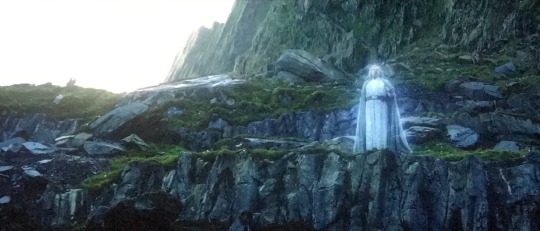
And I’m going to be rewatching this movie tomorrow so I’ll try to get some photos about what I’m talking about. It’s clearly there tho. Finn being force sensitive is also dropped.
The comparison here to what VLD S8 did is uncanny. Unlike with VLD, I don’t think the narrative betrayal here was malicious. Just unfortunate and sad. Unlike with VLD, I think TROS managed to save most of itself tho. I at least enjoyed it. The trend of not letting the Dark Youth learn and redeem themselves and LIVE is a disturbing one, however. All this is just my theory btw. I knew Carrie Fisher managed to film some of the movie and I was curious going in as to how they were going to keep her in and maintain their original story. Well, obviously they couldn’t. I like all the movies, but I wouldn’t say I have a favorite character tho (except the porgs). So all of my opinion here comes without trying to see things a certain way. I have no shipping lens here. I just have an eye for things that lack narrative symmetry and/or thematic follow through.
Anyway. If you found parts of the movie to be strange or missing in some way, I think my explanation here may help fill in some blanks. And regardless of the reason the storyline exists the way it does, the trend of killing off the character that is supposed to be redeeming themselves isn’t a good look.
[EDIT] As soon as I wrote this I went looking for other opinions on this and found this Polygon article! This explains so much and explains why Leia didn’t have a new look for the movie. Her footage is repurposed from footage from Chapter 7/8. Considering everything, it’s amazing they salvaged as much of the original storyline (Leia as teacher) as they did.
I’m going to rewatch the movie assuming all this should have happened to see how much sense it now makes. This is just what I picked up on by watching one time.
[EDIT2] Okay then there’s this. It confirms what I thought. A person in the thread below this tweet mentions how Finn’s Force connection here could explain why other storm troopers put down their weapons in their respective village raids. Like, they could hear Finn’s distraught inner voice when it was all happening. It’s why Kylo Ren slowly turns and looks at Finn in chapter 7. Finn frees other stormtroopers in other words and the movie drops this off his storyline completely. First Finn runs, then he learns to be a rebel, then he frees his fellow soldiers. I still think Finn’s pursuit of Rey was originally supposed to also be romantic, but more than that she is ultimately his teacher.
I actually think the original script was probably more Finn/Poe friendly, with Finn ready to help Poe (using the Resistance) to free more stormtroopers. Poe learning Finn’s secret: his Force sensitivity, after all, is also cut, against the entire start of the movie showing them as a team. Poe was essential to Finn’s initial escape. They needed each other. Then Poe is essential to Finn’s new mission. They choose each other, completely. I believe that’s the proper bookend we should have gotten there. And it explains Oscar’s PR commentary on Disney company.
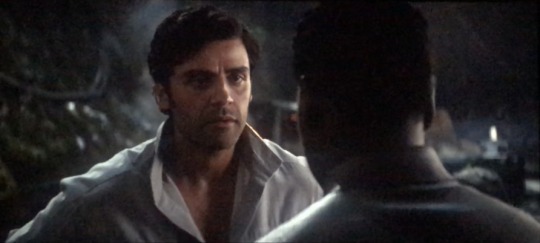
I’m.... there’s little they could have done here to salvage what I’ve pieced together of the original script. Not without Carrie. It would have looked great tho. Without her as (continual) teacher to Rey, much of the movie, the original script, sadly fell apart. Seeing how Finn/Poe as a narrative thread didn’t rely much on Carrie I think the editing here is a bit more malicious. I can’t prove that tho. I can only tell some of the outline of what originally should have happened. Finn gives up pursuit of Rey for choosing a mission with Poe. If TROS is to be compared to VLD S8, this feels like the equivalence of editing out Sheith.
[EDIT3] My bow commentary here is off. I remembered things wrong there. I’ve struck several things for my original post. I have a lot of screenshots now tho so I’ll write something more on this later once more time has past. Maybe JJ Abrams will talk about the rewrite process tho. I doubt the Finn/Poe stuff will be discussed, but I also don’t think it was ever intended to be textual, just subtextually coded. The repurposed Leia as teacher stuff tho, that may get discussed publicly. That one Hobbit actor looks to be written in to cover Leia’s intended plot explanations for why certain stuff is happening. Maz’ involvement, along with Rose’s was much regaled to this as well. Whatever their original storylines were, I believe they unfortunately got axed in the rewrite.
#zerbe discusses things#star wars the rise of skywalker#sw: tros#spoilers#star wars spoilers#TROS spoilers#the ghost narrative of TROS#reylo#at this point... when it comes to identifying ghost narratives... im like AH SHIT HERE WE GO AGAIN#hopefully if SPN finally does themselves right we should see this storyline of touch and healing done RIGHT#here’s hoping anyway#im tired
10 notes
·
View notes
Text
I often think about how I think that so much of what The Last Jedi tried to say got lost in the hatred of the movie. While I would in no way argue that it’s a perfect movie I do actually like it. And I understand that we all have different opinions of it and that it’s a good thing to talk about the things we didn’t like and why we didn’t like it so we can learn and listen to each other. But for me one of the things The Last Jedi sets out to do is to teach all the male characters something they didn’t know before, it’s about showcasing all their flaws in situations they would have normally been presumed to be right...and it’s done by all the female characters.
Women teaching men things in itself is already very unusual. The reason why is because in order to teach someone something they didn’t know they have to come from a position of power and that is already very unusual for women. But Leia, Rose and Rey all play essential roles as people with certain knowledge that the men don’t have.
If we start with Finn, and on the one hand I do agree with the critique of Finn’s character in this. He felt very under used and not as essential to the story as the rest of the characters which really is a shame. I do agree that he maybe got a little side tracked in it. I know many were unhappy with it and I felt that way about it too, but if we look past that for a moment and focus on his arc for a second to me it does two things. One, Finn starts off the movie being driven by an obsession to get away from the Resistance and find Rey, he doesn’t want anything to do with the war. His intentions are essentially driven by lack of faith because he thinks the Resistance cause is doomed. So Rose enters, and through the side mission they share, it serves the point of Rose pulling back the curtain and showing Finn the oppression the whole galaxy suffers by the First Order. She takes on the role of guide for Finn and comes from a standpoint of moral authority because she shows Finn the political reasons why The Resistance is necessary (Canto Bright has all these species gambling and winning money because of the war) and the moral reasons to why they fight (freeing the slaves from the stables). In teaching and showing Finn all these things she inspires him to eventually identify as a Rebel. She gives him all these things he didn’t have or didn’t know about before and that’s the underlying dynamic of their relationship. She inspires him to believe in something bigger than himself. The other thing Finn and Rose arcs do is that it tries to make the Resistance do something new. All we’ve ever seen of the Rebellion and the Resistance is fighting, against the Empire or the First Order. And the film is trying to say that they have to be for something else as well. They cannot only be anti and fight against the first order or the empire, they have to inspire positivity as well because otherwise people are going to feel no attachment to them whatsoever because they start to become this group of people that no one can touch or join. The Resistance and Rebellion have always been doing the same thing in each movie and because of it the film is trying to do something else instead. Rose story therefore becomes important because it’s about freeing slaves and righting things from wrong and doing the right thing. It is essentially about giving people hope (she gives it to Finn) and even though you don’t achieve what you sent out to do that’s still important. And it’s also important going forward into the Rise of Skywalker because if they don’t inspire any positivity or hope in the galaxy then no one else is going to support them or join them later on.
Okay let’s move on to Poe. For anyone knowing me knows that I love Poe, he’s my absolute favourite character (and also queer I take no complaints) and I know many didn’t like him in this movie either because he does come across as a dick, a likeable one but nonetheless a dick who is reckless and defies orders. And he’s met by women who challenges him, Leia and Holdo. The movie starts off with Poe being dangerous and arrogant, and only caring about being a hero. The movie’s first surprise comes in the beginning when we are expected to celebrate Poe’s ‘heroic’ action of taking down the Dreadnought. Poe gets told off about his victory and we as an audience are rebuked for celebrating it. But it forces you to think about consequences which many battle sequences and action narratives never forces you to do. But it makes you think about all the people who died just for a small thing. When Leia later is in a coma it’s expected that Poe would be the one to take over, it’s normally what happens. The brash hero is forced to become a leader, but that doesn’t happen either. Enters Holdo who is actually even less sympathetic towards Poe and his behaviour. She puts him down and calls him out for being a ‘trigger happy fly boy’ something Poe can’t stand. While Poe clearly operates from a place of care all the decisions he makes results in consequences that could have been prevented. He’s reprimanded until he learns how to listen to the people in command. (I do want to say I don’t think Poe is made out in this movie to disrespect women but I think he has problem with authority and having to take responsibility in general, he’s gone a while without having to. Because to me there is no argument that he would not respect Leia, that’s just silly. But this movie happens to actually have women who are in power positions that challenges him right out). In the end Poe learns from his mistakes by Leia and Holdo and chooses to put aside a personal need to be a hero and instead focus on the bigger picture. When Luke goes to fight Kylo Ren he realises he is stalling and instead of sending out the remaining people of the resistance he tells them all to escape and live instead.
And lastly Rey, she challenges Luke. Luke in this movie is not what anyone expected him to be like. He has become a cynical recluse living on his own (to me that makes maybe the most sense out of everything in this movie). Going through what Luke has gone through it seems logical that he would feel extremely guilty and scared. He also says something along the lines of “You expect me to walk out with my lightsaber and face down the first order” a heroic big action sequence that fans and the people in the galaxy expected him to do. He’s after all a cool badass Jedi master. But Rey who is a female untrained Jedi she consistently challenges this mythical hero legend on his failures. She confronts him and in the end it’s what inspires Luke to reconnect with the force. Rey is the one that makes him overcome his doubt about going forward. Luke doesn’t actually teach Rey what it’s like to be a Jedi it’s Rey who reminds of what it is. Rey inspires him to be better and because of that he literally does the same thing he mocked Rey for in the film earlier (he faces of against Kylo Ren in a fight).
So while I do understand the complaints this film did get because I would in no way say it’s a perfect movie I do prefer it to The Force Awakens. The second movie in a trilogy always need to teach their heroes something so they can overcome that at the time, so when the third movie comes along they will be at their best and have learnt from their past mistakes. In the Rise of Skywalker it looks like Poe is now finally leading the resistance where he will be responsible and want to inspire hope in the galaxy. Finn is now fully part of it and probably the second in command and Luke while dead will hopefully actually try and help Rey in her own quest about defeating the First Order and becoming a full on Jedi. (Also Rose is a commander in this yay).
As a last note, The Last Jedi is also about giving up things, but I might make a separate post about that lol.
#star wars#the force awakens#the last jedi#leia organa#rey#finn#poe dameron#rose tico#luke skywalker#text#my writings#this got really long but it ran away from me and I fully believe this is what the movie tries to do#rants
12 notes
·
View notes
Link
“Courtney Act says she’s enjoying an endless “hot girl summer”. Which, for those not initiated into American rap memes, basically means she’s having a damn good time.
“I’m kind of lubed up and ready for Mardi Gras, so to speak,” she says. As Australia’s most famous drag queen, active since the turn of the century, Courtney helped lead the mainstreaming of queer culture in this country along with figures such as Carlotta and Bob Downe.
But being a leader or pioneer doesn’t guarantee being comfortable in your own skin. Courtney says that until recently her understanding of sexuality and gender was actually quite limited. When she was performing, she was a woman, but when she stripped off her make-up, she went back to being Shane Jenek, a man.
“Although I did drag, my masculinity and femininity were compartmentalised in the binary,” Courtney says.
But over the past few years, as public discussion of gender, sexuality and identity has grown, she has discovered things are more complex than your genitals, clothes and hair.
“I think sometimes people think identity has something to do with the wrapping, but really it’s the gift underneath,” she says. “It’s about how you feel. For me, I definitely feel like I occupy masculine and feminine qualities.”
Courtney explores this journey in her pop-cabaret show, Fluid, showing this week at the Eternity Playhouse in Darlinghurst as part of the Sydney Gay and Lesbian Mardi Gras festival. It’s a change of pace for her after focusing on television in recent years; first by winning Britain’s Celebrity Big Brother in 2018, then as the runner-up (with Joshua Keefe) on last year’s Australian Dancing with the Stars.
It’s also a far cry from her humble beginnings in the DIY world of drag, which has never been regarded as high art but remains a staple of gay bars and culture worldwide.
“There’s a lot less hot glue and sticky tape in this show, which makes it feel a lot more professional,” Courtney says of Fluid. “I don’t know if that will hold until opening night.”
Set to original music, Fluid was written by Shane and American comedian Brad Loekle. For the most part it’s a one-woman show, with some help from a ballroom dancer in the second half. (“It’d be weird doing a ballroom dance by yourself,” she says.)
The show acknowledges that, more than ever, people are being flooded with “ever-changing and flowing ideas of who we are, what we are and what we might become”.
This is something we should embrace, says Courtney. “We change our clothes every day – we change our hairstyles, we change our jobs. Everything is constantly in motion and constantly fluid. But we have this idea that our identities are fixed. When we look at our lives they’re actually a lot more fluid than we think.”
Courtney, or Shane, doesn’t identify as trans but has said that seeing more transgender people represented in the media was liberating and allowed her to explore her own doubts about gender. She’s previously been described as “gender fluid, pansexual and polyamorous”, although she no longer embraces those labels as she once did.
“They all work,” says Courtney, who prefers to identify as “just generally queer” these days. “It’s funny … so many of our groups identify so strongly with labels and they’re so important to us. I kind of feel less attached to those labels.”
She also understands why some people might feel confused, or even confronted, by the politics of queer identification. The acronym LGBTQIA+, which stands for lesbian, gay, bisexual, transgender, queer, intersex, asexual and others, has expanded over the years to the point that some critics deride it as “alphabet soup”. Even those who are part of the community can be intolerant.
“I get that LGBTIQA+ is a little cumbersome from a marketing standpoint,” says Courtney. “But if you find yourself with the time to complain and be confused by a few extra letters, then you’re one of the lucky ones. If there are people that get to understand themselves more because of a letter in an acronym, I’m all for it.”
“I definitely feel like I occupy masculine and feminine qualities.”
Courtney casts a sceptical eye over everything, including the rise of cancel culture, a predominantly left-wing phenomenon which argues that anyone who says or does something deemed to be racist, sexist, homophobic or in any way offensive should be called out, shamed and, preferably, silenced.
Lamenting the state of political discourse while appearing on the ABC’s Matter of Fact program last year, she said: “The volume’s too loud now and everybody’s yelling.” While history showed that people sometimes need to raise their voices, “when you actually sit down opposite someone and have a conversation with them, you get so much further”.
How, then, does Courtney view the debate over religious freedom that has raged ever since Australians voted to legalise same-sex marriage in 2017? She says it’s clear that sometimes people, especially older white males, perceive other people gaining rights as a threat to their own. She says religion can be a lost cause because it is, by definition, about faith rather than rational argument. Still, queer people have to make the effort to engage.
“The way to do that is to get people to picture themselves in other people’s experiences. That’s the only way you can foster that empathy.
“Rather than yelling aggressively back at the people trying to oppress us, I think the most important thing to do is to share our stories.”
Another thing you can do, of course, is march. This weekend, Mardi Gras culminates in the annual parade up Oxford Street, which will feature more than 200 floats and 10,000 marchers. For the first time, Courtney will co-host the coverage on SBS with comedians Joel Creasey and Zoe Coombs Marr, and Studio 10 presenter Narelda Jacobs.
She had something of a practice run hosting the coverage on Foxtel some years ago. “I saw a clip of it the other day,” she says. “And I’m definitely hoping to redeem myself.”
As a character, Courtney has been on the gay scene for about 20 years. The person behind the facade, Shane, turned 38 last week. He grew up in Brisbane and remembers watching the parade on television as a teenager in the 1990s, huddled up close to the TV so he could quickly switch it off
if his parents came downstairs.
Shane came to Sydney when he was 18 and attended his first Mardi Gras. “I just remember it was such a melting pot of people,” he says. “It was the first time I really understood what a community was: that there were all these different parts, and we all faced different challenges and struggles.”
But even then, Shane says he failed to really comprehend about what Mardi Gras was all about. Just like many heterosexual critics over the years, as a young man he gawked at the giant dancing penises, fetish-wear and nudity and wondered: why?
“I remember thinking: why can’t they just be normal?” Shane says. “Have your parade, but why does it have to be about sex and penises? Because I had shame about all of those things. I realise now that the parade’s brash display of sexuality liberates the shame … it’s a really radical way to shake people and say there’s nothing wrong with sexuality – not just homosexuality but sexuality in general.”
The queer community has given Shane a lot: acceptance, identity, a career and fame. It has taken him to Los Angeles, where he was based for some years until 2018, and now to his new home in London.
Love, on the other hand, remains elusive. He is “on the rebound” at the moment, though eternally optimistic. “It’s Mardi Gras time, it’s summer in Sydney, I think this is the perfect time to be single. Maybe I’ll find love under a disco ball at the after-party.”
Incredibly, at 38, Shane is about to attend his first ever wedding, straight or gay – his friend Tim is marrying his partner Ben. It is set to be a baptism of fire. “They have asked my ex-boyfriend and me to give the best man’s speech together, which could be slightly sadistic,” he says.
Shane is still adjusting to the relatively new world of same-sex marriage. It’s not for everyone – many queers still think of it as a conservative and unnecessary institution – but it’s growing on him. “Weirdly, seeing all these people get married, I feel like my cold heart has melted a bit,” he says. “I think there’s something really beautiful about marriage.”
It’s a reminder of why events like the Mardi Gras are still so important – a celebration of diversity at the same time as the old divisions between straight and gay are knocked down. As well as marriage, this can manifest in small shifts, like the politics of Bondi Beach.
“I was at North Bondi on Saturday [and] it was surprisingly unlike North Bondi,” Shane says. “It was all families and those banana umbrella things. I was like, ‘Oh, I remember when this used to be [gay nightclub] ARQ, but with more light.’"
“I guess that’s the progress we fought for – the families are happy occupying the gay beaches now.”
Fashion director Penny McCarthy. Photographer Steven Chee. Hair Benjamin Moir at Wigs By Vanity.
SBS’s Mardi Gras broadcast airs live from 7.30pm on February 29. Fluid will return for a tour of Australia and NZ in spring.
This article appears in Sunday Life magazine within the Sun-Herald and the Sunday Age on sale February 23.”
Courtney’s interview for The Sydney Morning Herald - February 21, 2020
2 notes
·
View notes